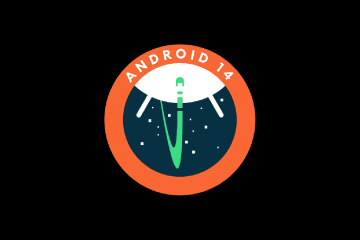นี่คือบทบรรณาธิการความคิดเห็นโดย Anita Posch ผู้ก่อตั้ง Bitcoin For Fairness ซึ่งเดินทางไปทั่วโลกอย่างกว้างขวางเพื่อเรียนรู้วิธีที่ผู้ไม่มีบัญชีธนาคารทั่วโลกสามารถได้รับประโยชน์จากเงินสาธารณะ
ในปี 2022 ทวีปยุโรป นักการเมืองได้ริเริ่มโดยมีเป้าหมายเป็น ห้ามการทำเหมืองพิสูจน์การทำงาน เนื่องจากมีการใช้ไฟฟ้าสูง เป้าหมายพื้นฐานคือการตำหนิ Bitcoin ว่าสร้างความเสียหายต่อสิ่งแวดล้อม ในขณะที่พวกเขาอ้างว่าเป็นเพียงเครื่องมือสำหรับการเก็งกำไรที่ไร้ประโยชน์
ในปี 2021 ผู้ร่วมก่อตั้ง Ripple ซึ่ง โฆษณาตัวเองว่ามีคุณภาพดีกว่า bitcoin บริจาคเงิน 5 ล้านดอลลาร์เพื่อสนับสนุน Greenpeace USA ด้วยแคมเปญที่ชื่อว่า”Clean Up the Code”พยายามล็อบบี้นักพัฒนา Bitcoin ให้เปลี่ยนกลไกการขุดจากการพิสูจน์การทำงานเป็นการพิสูจน์การเดิมพัน ซึ่งคาดว่าจะลดการใช้พลังงานลง 99% เมื่อ Ethereum ย้ายจากการพิสูจน์การทำงานไปสู่การพิสูจน์การเดิมพันเมื่อเร็วๆ นี้ นักแสดงเหล่านี้รู้สึกว่าพวกเขาได้เห็นทฤษฎีของพวกเขาได้รับการยืนยันแล้ว และกำลังพยายามล็อบบี้กับ Bitcoin มากยิ่งขึ้น
สิ่งที่พวกเขาไม่ได้พูดถึงก็คือ ความแตกต่างระหว่างหลักฐานการทำงานกับหลักฐานการเดิมพันนั้นมีมาก กลไกเหล่านี้มีเป้าหมายที่แตกต่างกันและผลลัพธ์ที่แตกต่างกันมาก ซึ่งส่งผลให้คุณสมบัติที่แตกต่างกันของสกุลเงินดิจิทัลที่พวกเขารักษาความปลอดภัย กล่าวโดยย่อ: ความไม่เปลี่ยนรูปของหลักฐานการทำงานนั้นแข็งแกร่งกว่าหลักฐานการเดิมพัน
หลักฐานการทำงานจะดีกว่าในการสร้างบล็อกเชนที่แข็งแกร่งและไม่เปลี่ยนรูป ซึ่งมีระดับการกระจายอำนาจที่ยุติธรรมและไม่สามารถแก้ไขได้ง่าย แม้แต่โดยองค์กรและหน่วยงานที่ร่ำรวย มีอิทธิพลมาก และมีอำนาจมาก Proof of stake ไม่มีเป้าหมายเหล่านี้ มีเป้าหมายในการกำกับดูแลในลักษณะที่เป็นมิตรกับสิ่งแวดล้อมซึ่งยังคงรักษาการกระจายอำนาจไว้ แต่ให้ความยืดหยุ่นบางอย่างของ blockchain ในช่วงไม่กี่สัปดาห์หลังการเปลี่ยน Ethereum ผู้ตรวจสอบความถูกต้องจำนวนมากเริ่ม เซ็นเซอร์ธุรกรรมตามรายการคว่ำบาตรของสำนักงานควบคุมทรัพย์สินต่างประเทศของสหรัฐอเมริกา (OFAC)
หลักฐานการทำงานทำให้ Bitcoin ไม่ถูกเซ็นเซอร์ ไม่เปลี่ยนรูป และไม่ได้รับอนุญาต นี่คือคุณสมบัติในการต่อต้าน เป็นเครื่องมือสำหรับการป้องกันตนเองทางการเงินและม้าโทรจันเพื่ออิสรภาพ Bitcoin เป็นการปฏิวัติเงียบ มันให้อำนาจการต่อต้านทางแพ่ง เป้าหมายเดียวของเราคือการหาเงินที่ดีกว่าซึ่งบังคับใช้สิทธิมนุษยชนอย่างแข็งขันและสนับสนุนนักเคลื่อนไหวในการต่อต้านเผด็จการและเผด็จการ
ในบทความนี้ ฉันจะไม่พูดถึงการใช้พลังงาน เพราะทันทีที่คุณเข้าใจ ความสำคัญของ Bitcoin ในการทำให้โลกมีความยุติธรรมมากขึ้น คุณจะเข้าใจได้ว่าปริมาณพลังงานที่ใช้อยู่นอกประเด็น คุณจะเข้าใจได้ดียิ่งขึ้นเมื่อคุณเข้าใจว่าการขุด Bitcoin นั้นรักษามูลค่ารวมที่จัดเก็บไว้ในบล็อกเชนและทำให้เป็นเครือข่ายที่ปลอดภัยที่สุดที่เรารู้จัก และยิ่งไปกว่านั้น การขุด Bitcoin เป็นหนึ่งในอุตสาหกรรมที่เป็นมิตรต่อสิ่งแวดล้อมที่สุดในโลก
ในบทความต่อไปนี้ ฉันได้อธิบายว่า Bitcoin บังคับใช้ 7 ใน 30 บทความที่กล่าวถึงใน ปฏิญญาสากลว่าด้วยสิทธิมนุษยชน ควรเป็นที่ชัดเจนว่า Bitcoin ไม่ได้ไร้ประโยชน์หรือเป็นเพียงเครื่องมือสำหรับการเก็งกำไร
ปฏิญญาสากลว่าด้วยสิทธิมนุษยชน
ย้อนเวลากลับไปในเดือนธันวาคม 1948 สามปีหลังจากสิ้นสุด สงครามโลกครั้งที่ 2 โลกยังคงหวาดผวากับสิ่งที่เกิดขึ้นตั้งแต่เยอรมนีโจมตีโปแลนด์ใน กันยายน 1939 มันเริ่มต้นสงครามที่กินเวลาหกปี คร่าชีวิตผู้คนไปประมาณ 80 ล้านคน รวมถึง ชาวยิวหกล้านคน และชนกลุ่มน้อยอื่นๆ อีกมากมาย เช่น Roma, Sinti, Black Germans, the differentlybled, socialists, communityists และคนรักร่วมเพศ
ด้วยเหตุนี้ สหประชาชาติจึงก่อตั้งขึ้นในปี 2488 โดย 51 ประเทศ มุ่งมั่นที่จะรักษาสันติภาพและความมั่นคงระหว่างประเทศ พัฒนาความสัมพันธ์ฉันมิตรระหว่างประเทศ และส่งเสริมความก้าวหน้าทางสังคม มาตรฐานการครองชีพที่ดีขึ้น และสิทธิมนุษยชน
ผลลัพธ์ประการหนึ่งคือปฏิญญาสากลว่าด้วยสิทธิมนุษยชนซึ่งประกาศเมื่อวันที่ 10 ธันวาคม 1948 ในหลายทศวรรษต่อมา ได้รับการบูรณาการ เข้าสู่กฎหมายของหลายๆ ประเทศ และถือเป็นมาตรฐานความสำเร็จร่วมกันสำหรับทุกคนและทุกชาติ เป็นครั้งแรกในประวัติศาสตร์ของมนุษย์ที่กำหนดให้สิทธิมนุษยชนขั้นพื้นฐานได้รับการคุ้มครองในระดับสากล และได้รับการ แปลเป็นภาษาต่างๆ มากกว่า 500 ภาษา
คณะกรรมการสหประชาชาติซึ่งมี เป็นประธาน Eleanor Roosevelt ร่าง 30 บทความ หรรษา จิวราจ เมธา นักการศึกษาชาวอินเดีย นักเรียกร้องอิสระ นักสิทธิสตรี และนักเขียน เป็นผู้รับผิดชอบในการเปลี่ยนภาษาของปฏิญญาสากลว่าด้วยสิทธิมนุษยชนจาก”มนุษย์ทุกคนเกิดมาอย่างอิสระและเท่าเทียมกัน”เป็น”มนุษย์ทุกคนเกิดมาอย่างเสรีและเท่าเทียมกัน”โดยเน้นย้ำถึง ต้องการความเท่าเทียมทางเพศ

ที่มา
ปฏิญญาสากล ของสิทธิมนุษยชนทำหน้าที่เป็นข้อเสนอแนะสำหรับกฎหมายหลายฉบับ กฎหมายสามารถบังคับใช้หรือไม่ กฎหมายในตัวมันเองไม่ได้รับประกันว่าจะมีใครปฏิบัติ เท่าเทียมกันหรือไม่ถูกเลือกปฏิบัติหรือพ้นจากความทุกข์ยากภายใต้การกดขี่ทางการเงิน ตรงกันข้ามกับกฎหมายที่บังคับใช้โดยมนุษย์ โปรโตคอลที่บังคับใช้โดยกฎทางคณิตศาสตร์ที่สร้างขึ้นโดยฉันทามติกับผู้ใช้ทุกคนจะไม่เลือกปฏิบัติและจัดเตรียมระบบการเงินที่ครอบคลุม “กฎที่ไม่มีไม้บรรทัด” ดังที่ Andreas M. Antonopoulos กล่าว
คำถามยังคงอยู่: ชีวิตและอิสรภาพของผู้คนนับพันล้านมีค่าไฟฟ้าเท่าไร? ผู้คนในภาคเหนือที่พัฒนาแล้วตัดสินใจได้อย่างไรว่าการใช้พลังงานที่ดีสำหรับภาคใต้เป็นอย่างไร? นอกเหนือจากเครื่องมือสำหรับ”การเก็งกำไร”แล้ว Bitcoin ยังเป็นเครื่องมือที่ยอดเยี่ยมสำหรับความเป็นส่วนตัวและอำนาจอธิปไตยทางการเงินทั่วโลกหรือไม่
ลองมาดูสถานะของโลกในปัจจุบันและวิธีการที่ระบอบการกำกับดูแลทั่วโลกนี้เกิดขึ้นมา เข้าสู่ตำแหน่งที่กำหนดว่าใครมีความเป็นไปได้และใครไม่มี
สภาวะของโลก
การกระจายประชาธิปไตยที่ไม่เท่าเทียมกัน
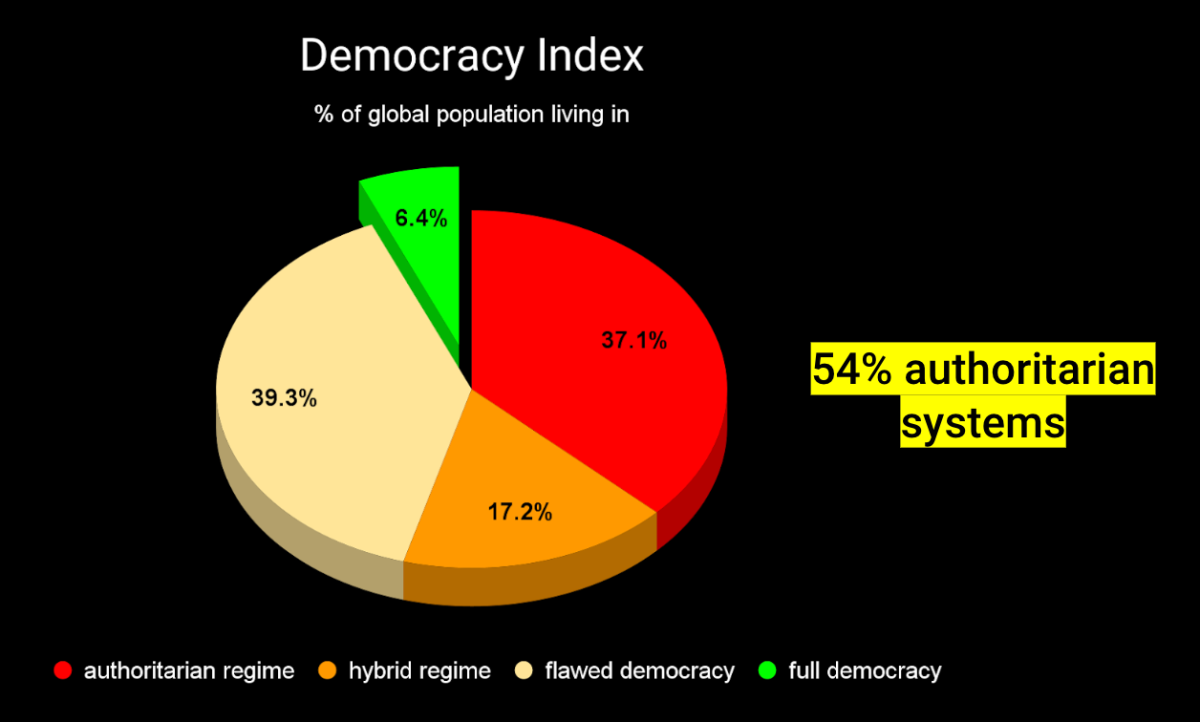
ห้าสิบสี่เปอร์เซ็นต์ของประชากรโลกอาศัยอยู่ในระบอบเผด็จการหรือระบอบผสม พวกเขาไม่ได้รับสิทธิพิเศษในการใช้ชีวิตในระบอบประชาธิปไตยเต็มรูปแบบ มีคนเพียง 6.4% เท่านั้นที่อาศัยอยู่ในประเทศที่เป็น “ประชาธิปไตยเต็มรูปแบบ” เช่น เยอรมนี ฝรั่งเศส ออสเตรีย และอื่นๆ หรือในสหรัฐอเมริกา ประเทศอื่นๆ ทั้งหมดทั่วโลกอาศัยอยู่ในระบอบประชาธิปไตยที่มีข้อบกพร่อง หรือไม่ก็อยู่ในระบอบเผด็จการเต็มรูปแบบหรือระบอบเผด็จการ. สถานที่ที่คุณเกิดเป็นตัวกำหนดโอกาสในชีวิตของคุณเป็นส่วนใหญ่ (ข้อยกเว้นเกิดขึ้นน้อยมาก)
ดูแผนที่ดัชนีประชาธิปไตยแสดงรูปแบบที่ต้องจดจำ พื้นที่สีแดงเข้มคือประเทศที่ชีวิตเลวร้ายที่สุด ประชาชนมีเสรีภาพน้อยที่สุด ประเทศที่แย่ที่สุดตามตัวชี้วัดนี้คืออัฟกานิสถาน รองลงมาคือเมียนมาร์ เกาหลีเหนือ สาธารณรัฐประชาธิปไตยคองโก ซีเรีย และสาธารณรัฐแอฟริกากลาง
ศูนย์กลางแห่งการทุจริต
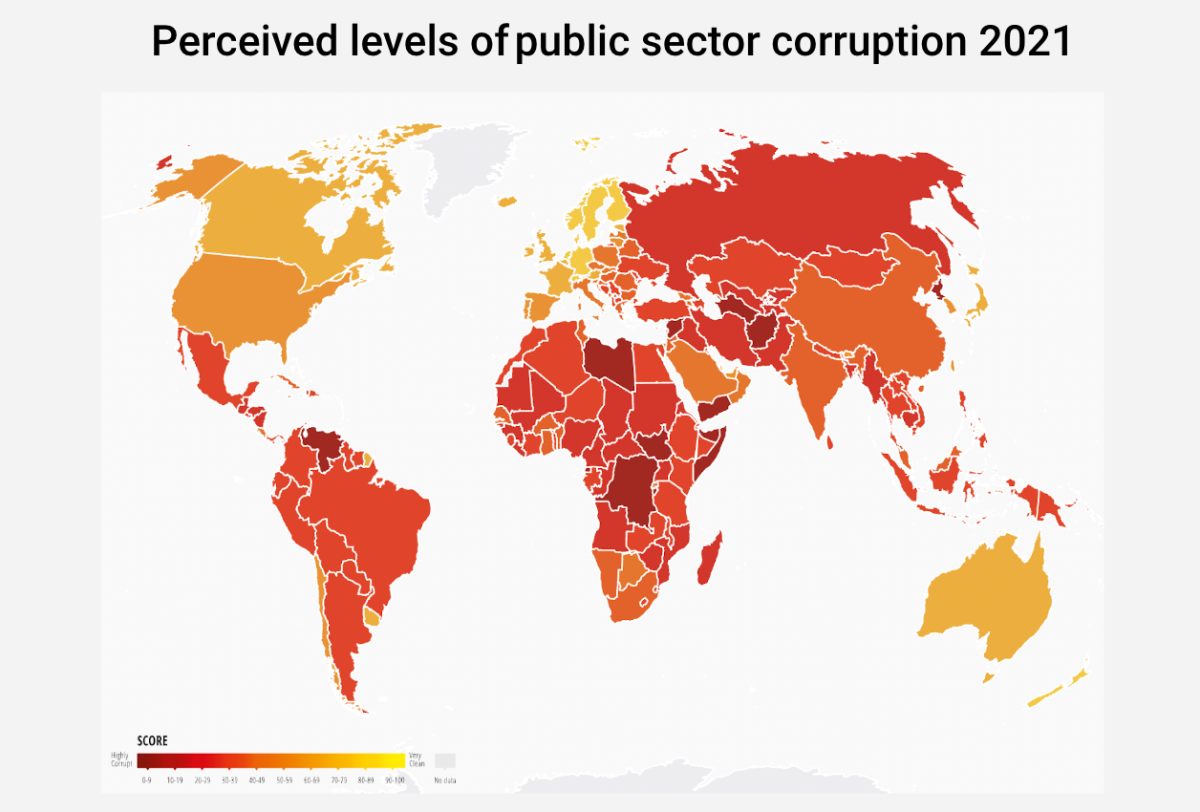
การดูแผนที่การทุจริตทางการเมืองแสดงให้เห็นรูปแบบที่คล้ายกัน พื้นที่สีแดงเข้มทอดยาวจากภาคตะวันออกเฉียงเหนือ เริ่มต้นในรัสเซียและจีน ครอบคลุมแอฟริกาและอเมริกาใต้ ดูเหมือนจะมีความสัมพันธ์บางอย่างระหว่างการคอร์รัปชันกับประชาธิปไตยที่ล้มเหลว นั่นคือการคอรัปชั่นทำให้เกิดการละเมิดสิทธิมนุษยชนและทำให้ประชาธิปไตยเสื่อมถอย ในทางกลับกัน ปัจจัยเหล่านี้นำไปสู่การคอร์รัปชันในระดับที่สูงขึ้น ทำให้เกิดวงจรอุบาทว์
ความไม่เท่าเทียมกันของความมั่งคั่ง
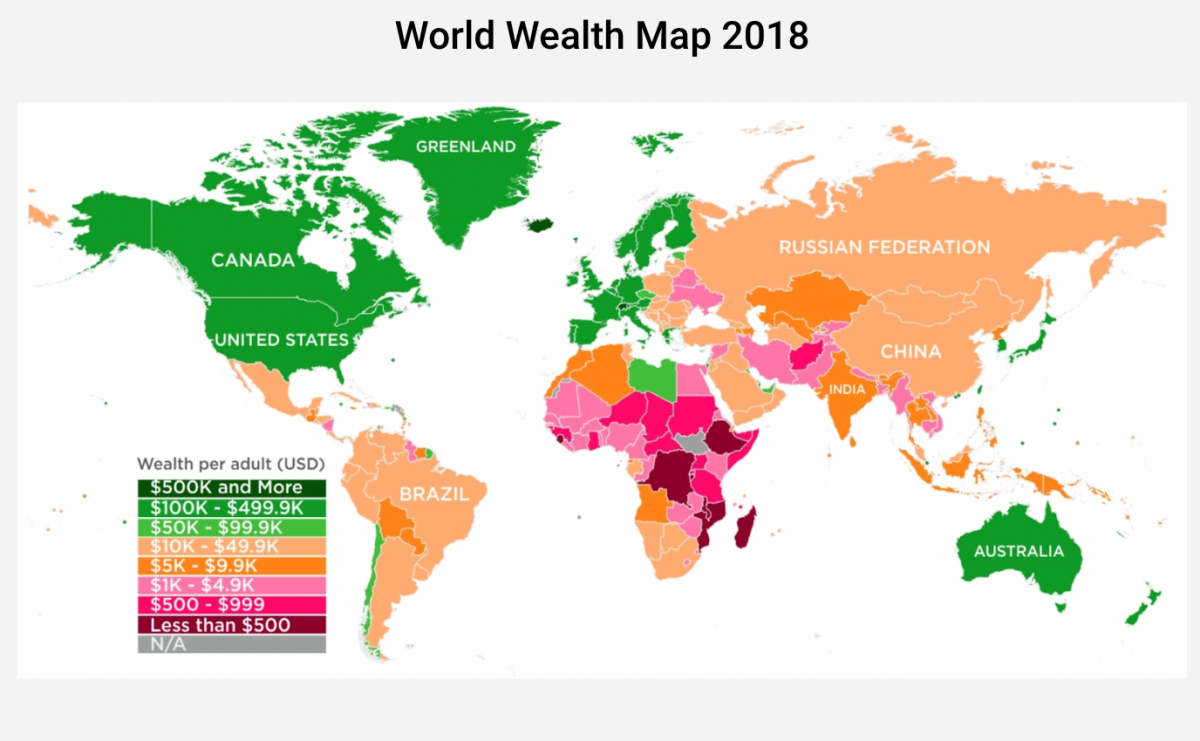
สุดท้าย มาดูแผนที่ความมั่งคั่งของโลกกัน จะเห็นรูปแบบเดียวกัน ในประเทศที่มีเผด็จการและผู้นำเผด็จการ โดยเฉลี่ยแล้วผู้คนจะยากจนกว่า โดยประเทศที่ยากจนที่สุดอยู่ในแอฟริกาและตะวันออกกลาง
มูลค่าสุทธิเฉลี่ยทั่วโลกบ่งชี้ถึงความเหลื่อมล้ำอย่างมากระหว่างประเทศที่พัฒนาแล้วและ คนอื่นล่ะ. ที่สุดขั้วหนึ่ง มีประเทศที่มีมูลค่าสุทธิ (โดยวัด”มูลค่าสุทธิ”เป็นมูลค่าตลาดของสินทรัพย์ทั้งหมดลบด้วยหนี้สินคงค้าง) มีจำนวนมากกว่า 500,000 ดอลลาร์ และในอีกทางหนึ่ง มีสถานที่ที่ผู้คนมีเงินน้อยกว่า 500 ดอลลาร์ ชื่อของพวกเขา. มีประเทศสีส้มอ่อนอยู่ประปรายระหว่างนั้น แต่แผนที่ทั่วโลกแสดงให้เห็นระดับความไม่เท่าเทียมกันอย่างน่าอัศจรรย์ระหว่างผู้มีและคนไม่มี
ประวัติศาสตร์ของอำนาจทางการเงิน
อังกฤษ เอ็มไพร์
สาเหตุของความไม่เท่าเทียมกันมีมากมาย ลัทธิล่าอาณานิคมเป็นหนึ่งในนั้นอย่างแน่นอน แผนที่ด้านล่างนี้แสดงจักรวรรดิอังกฤษในปี 1910 การควบคุมทางการเมืองและเศรษฐกิจนี้ทำให้สหราชอาณาจักรกลายเป็นเจ้าโลกทางการเงินรายแรก (“เจ้าโลก” หมายถึงรัฐเดี่ยวที่มีอิทธิพลชี้ขาดเหนือการทำงานของระบบการเงินระหว่างประเทศ) ในปี 1910 เงินปอนด์ของอังกฤษเป็น ซึ่งยังคงได้รับการสนับสนุนจาก ทอง (มาตรฐานทองคำหมายความว่าเงินหมุนเวียนทั้งหมดได้รับการสนับสนุนจากทองคำในคลังของธนาคารแบบตัวต่อตัว) และทุกคนใช้มันเพื่อการค้า
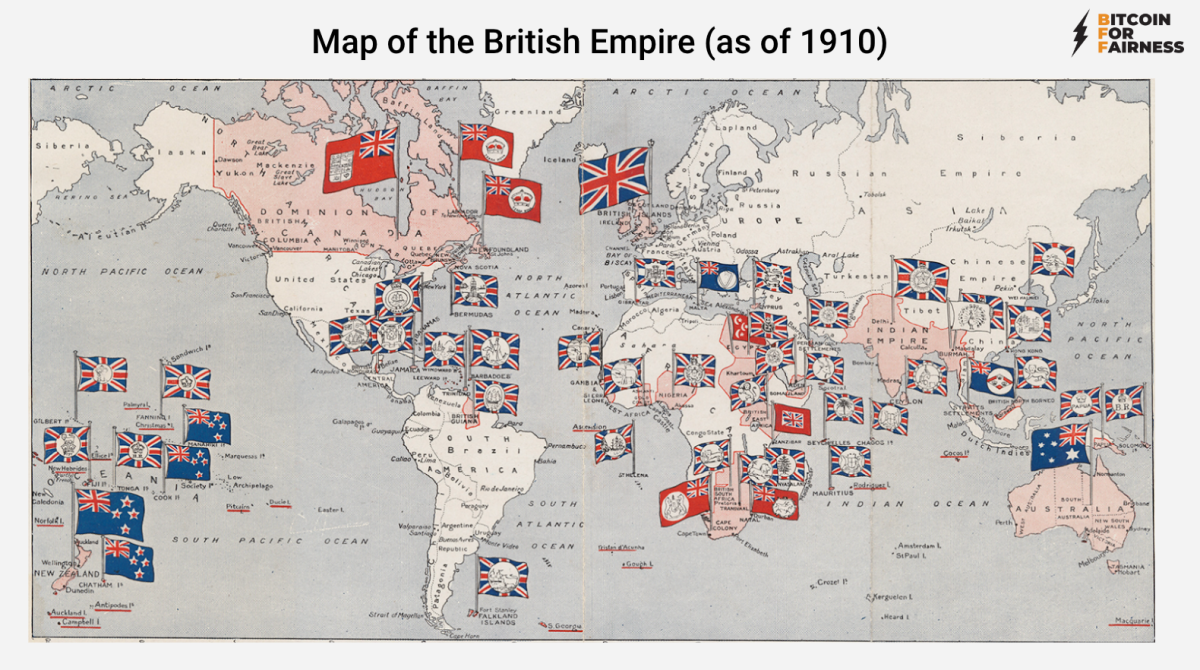
อำนาจของสหรัฐอเมริกา
หลังจากสงครามโลกครั้งที่หนึ่ง อำนาจของอังกฤษก็จางหายไป สงครามโลกครั้งที่สองสร้างเจ้าโลกใหม่ สหรัฐอเมริกาชนะสงคราม มีอำนาจทางเศรษฐกิจสูงสุด และควบคุม โดยพื้นฐานแล้วเป็นทองคำสำรองทั้งหมดของโลก ในช่วงสงคราม หลายประเทศในยุโรปได้ส่งทองคำสำรองไปยังสหรัฐอเมริกาเพื่อป้องกันไม่ให้ถูกขโมยโดย พวกนาซี
นักวิเคราะห์การเงิน Lyn Alden อธิบาย:
“ด้วยระบบ Bretton Woods และระบบ petrodollar ต่อไปนี้ สหรัฐอเมริกาได้รับการล็อคในระบบเงินระหว่างประเทศที่ใกล้เคียงกับทั่วโลก สกุลเงินของจักรวรรดิก่อนหน้านี้ไม่เคยได้รับการล็อคทางการเงินอย่างสมบูรณ์ในโลก ดังนั้นจึงไม่เคยเป็นสกุลเงิน’สำรองทั่วโลก’ที่แท้จริง แต่แทนที่จะเป็นเพียงสกุลเงิน’ที่รู้จักอย่างกว้างขวางและมีอำนาจเหนือกว่า’…
“อย่างไรก็ตาม หลังจากเพียง ทศวรรษที่ระบบ Bretton Woods เริ่มล้มเหลว สหรัฐอเมริกาเริ่มขาดดุลการคลังจำนวนมากและประสบกับระดับเงินเฟ้อที่เพิ่มขึ้นเล็กน้อย ครั้งแรกสำหรับโครงการภายในประเทศช่วงปลายทศวรรษ 1960 และจากนั้นสำหรับสงครามเวียดนาม สหรัฐอเมริกาเริ่มเห็นปริมาณทองคำสำรองลดลง ขณะที่ประเทศอื่นๆ เริ่มสงสัยในการสนับสนุนเงินดอลลาร์ จึงแลกเงินดอลลาร์เป็นทองคำแทนที่จะถือดอลลาร์อย่างสบายใจ…
“ระบบมีข้อบกพร่องพื้นฐานตรงที่เมื่อ ปล่อยให้ไม่มีที่อยู่ทำให้ระบบหยุดทำงาน มันไม่เคยยั่งยืนอย่างแท้จริงตามที่ออกแบบไว้ ไม่มีทางที่สหรัฐฯ จะรักษาทองคำไว้ได้มากพอที่จะสำรองสกุลเงินทั้งหมดเพื่อใช้ในประเทศ และในขณะเดียวกันก็สำรองสกุลเงินให้เพียงพอสำหรับการขยายการใช้งานทั่วโลกด้วย (ซึ่งเป็นส่วนที่แลกได้)”
การกำเนิดของระบบ Fiat
ขณะที่ Alden ดำเนินการต่อ:
“ในที่สุดในปี 1971 คณิตศาสตร์กลับมาพร้อมกับการล้างแค้นในระบบ Bretton Woods และ Richard Nixon ก็ยุติการแปลงสกุลเงินดอลลาร์เป็นทองคำ และทำให้ระบบ Bretton Woods สิ้นสุดลง การปิดการแปลงสภาพด้วยทองคำถูกเสนอให้เป็นการชั่วคราวในเวลานั้น แต่ในที่สุดก็กลายเป็นการถาวร แทนที่จะย้ายไปประเทศอื่น สหรัฐฯ สามารถจัดระเบียบระบบการเงินโลกใหม่ได้โดยที่ตัวมันเองยังคงเป็นศูนย์กลางในระบบถัดไป”
เมื่อ Richard Nixon ยกเลิกมาตรฐานทองคำในปี 1971 โดยพื้นฐานแล้วเขาแปลงสกุลเงินทั้งหมดในโลกเป็นเงิน fiat “Fiat“เป็นคำภาษาละตินที่แปลว่า”ปล่อยให้มันทำ”ตั้งแต่ปี 1971 เป็นต้นมา สกุลเงินของเราไม่ได้ถูกหนุนด้วยทองคำอีกต่อไป และจะมีมูลค่าเพียงเพราะเป็นสกุลเงินที่ถูกต้องตามกฎหมายเท่านั้น ผลกระทบทางเศรษฐกิจอย่างใหญ่หลวง
นับเป็นครั้งแรกในประวัติศาสตร์ที่มีเฉพาะสกุลเงิน fiat. สิ่งนี้อาจนำไปสู่ปัญหาร้ายแรง เช่น เมื่อมีคนพยายามใช้กระดาษที่พิมพ์ในประเทศอื่น เหตุใดธุรกิจและรัฐบาลในประเทศอื่น ๆ จึงควรยอมรับกระดาษซึ่งรัฐบาลต่างประเทศสามารถพิมพ์ได้ไม่รู้จบและไม่มีการสนับสนุนที่มั่นคง เป็นรูปแบบการชำระเงินสำหรับสินค้าและบริการที่มีค่าของพวกเขา ระบบเงินตรามีปัญหา
Petrodollar
ในปี 1974 หลังจากความขัดแย้งทางภูมิรัฐศาสตร์ต่างๆ รวมถึง สงครามถือศีลกินผัก และ โอเปกห้ามค้าน้ำมัน สหรัฐอเมริกา และซาอุดีอาระเบีย บรรลุข้อตกลงที่จะขายน้ำมันเฉพาะในสกุลเงินดอลลาร์สหรัฐเพื่อแลกกับการคุ้มครองและความร่วมมือของสหรัฐ จากจุดนั้น โลกก็ตั้งอยู่บนระบบเปโตรดอลล่าร์ เป็นวิธีที่ชาญฉลาดในการทำให้ระบบสกุลเงิน fiat ทั่วโลกทำงานได้ดีพอ
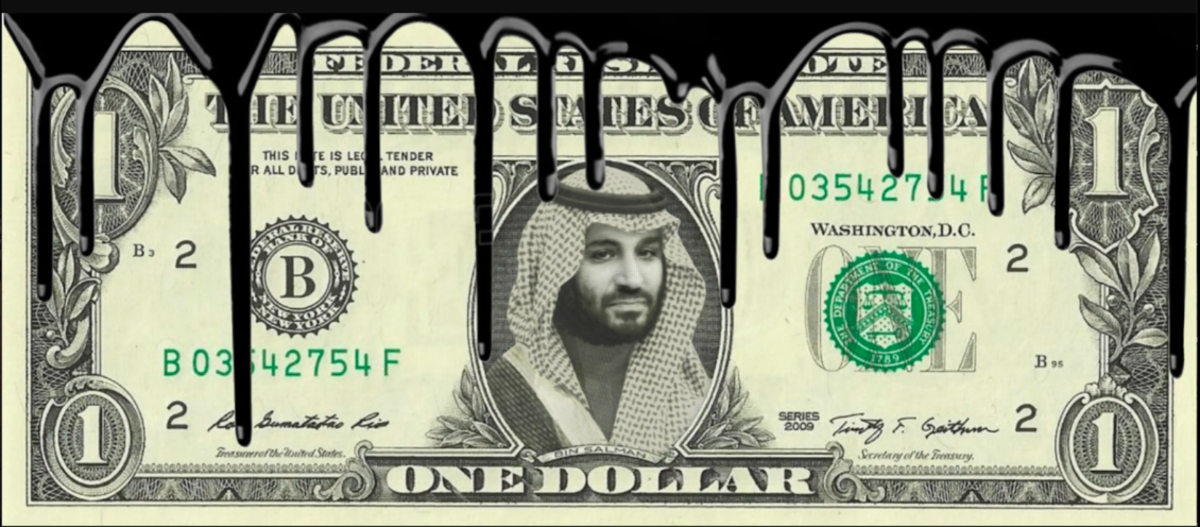
แหล่งที่มา
The Petrodollar ตั้งแต่ปี 1974
แต่ระบบกำลังแตกร้าวที่นี่และที่นั่น ตัวอย่างเช่น ในเดือนสิงหาคม พ.ศ. 2560 เวเนซุเอลาประกาศว่าจะยุติการกำหนดราคาน้ำมันเป็นดอลลาร์สหรัฐฯ และใช้เงินยูโร หยวน และสกุลเงินอื่นๆ แทน ในเดือนมีนาคม 2022 รายงานของสื่อเสนอว่าซาอุดีอาระเบียกำลังพิจารณากำหนดราคาขายน้ำมันบางส่วนให้จีนในสกุลเงินหยวนจีนแทนที่จะเป็นดอลลาร์สหรัฐฯ วันที่ 23 มีนาคม 2022 Vladimir Putin ประกาศคำสั่ง ห้ามประเทศที่”ไม่เป็นมิตร”(รวมถึงประเทศในสหภาพยุโรป สหรัฐอเมริกา และญี่ปุ่น) ซื้อก๊าซรัสเซียในสกุลเงินอื่นใดนอกจากรูเบิลรัสเซีย (แม้ว่าการเงินของรัสเซีย กระทรวง มีรายงานว่าจะรับทองคำหรือ bitcoin ด้วย)
A Decentralized ระบบการเงินโลก
กรณีพื้นฐานของ Alden ในอนาคต คือ:
“…ในอีกหลายปีข้างหน้า เศรษฐกิจโลกจะพบกับวงจรหมีของระบบปิโตรดอลล่าร์ในปัจจุบัน หากเป็นเช่นนั้น สินทรัพย์ เช่น หุ้นทั่วโลก อสังหาริมทรัพย์เพื่อการอยู่อาศัยที่มีคุณภาพ โลหะมีค่า สินค้าอุตสาหกรรม และทางเลือกอื่นๆ เช่น Bitcoin มีแนวโน้มที่จะไปได้ดี
จากจุดนั้น ระบบการเงินทั่วโลกจะค่อย ๆ มีการกระจายอำนาจมากขึ้น ในแง่ที่ว่าระบบการชำระเงินทางเลือกและการชำระสกุลเงินอื่น ๆ ในหมู่คู่ค้ากำลังเพิ่มขึ้นในการใช้งาน นี่จะเป็นการเปลี่ยนแปลงเชิงโครงสร้างสู่ระบบใหม่อย่างแท้จริง มันอาจเกิดขึ้นอย่างช้าๆ อย่างที่เป็นอยู่ หรืออาจเร่งตัวขึ้นหากสหรัฐฯ เองเปลี่ยนออกจากระบบที่แตกร้าวเช่นกัน”
ผลที่ตามมาจากความเป็นเจ้าโลกทางการเงิน
สำหรับ อย่างน้อยที่สุดในช่วง 78 ปีที่ผ่านมาซึ่งมีการสิ้นสุดของสงครามโลกครั้งที่สอง เศรษฐกิจโลกหมุนรอบเงินดอลลาร์สหรัฐไม่มากก็น้อย ระบบ Bretton Woods ยังเป็นจุดเริ่มต้นของสถาบันการเงินระดับโลก เช่น กองทุนการเงินระหว่างประเทศ (IMF) และธนาคารโลก ตั้งแต่นั้นเป็นต้นมา มีการเปิดตัวองค์กรเพิ่มเติมจำนวนมาก เช่น ธนาคารเพื่อการชำระหนี้ระหว่างประเทศ (BIS), Financial Action Task Force (FATF) และ OFAC ตัวแทนที่ไม่ได้รับการเลือกตั้งกำลังคิดค้นกฎเพื่อต่อสู้กับการฟอกเงิน การหลีกเลี่ยงภาษี และการก่อการร้ายในช่วงไม่กี่ทศวรรษที่ผ่านมา
ฉันไม่เคยได้ยินเกี่ยวกับกฎระเบียบทางการเงินใด ๆ ที่ประชากรลงคะแนนเสียง แต่ทุกประเทศในโลกต้องควบคุมธนาคารของตน ด้วยเหตุผลที่ดี แต่ถึงแม้จะมีกฎระเบียบที่ครอบคลุม โลกยังคงเต็มไปด้วยการฉ้อโกง ความล้มเหลวของธนาคาร (และตอนนี้ การฉ้อโกง cryptocurrency ในกรณีเช่น FTX, Luna เป็นต้น) และการฟอกเงิน มีเพียงปลาตัวเล็กเท่านั้นที่ถูกจับได้ ในขณะที่ปลาตัวใหญ่โดยส่วนใหญ่เพียงแค่จ่ายค่าปรับซึ่งน้อยกว่ากำไรของพวกมันและเดินหน้าต่อไป
มีกฎระเบียบและกฎหมายเพียงพอแล้วเกี่ยวกับการเงินแบบดั้งเดิมและสกุลเงินดิจิทัล อุตสาหกรรม. การล่มสลายของ FTX เกิดจากการฉ้อโกง ไม่ใช่เพราะ Bitcoin เป็นเครื่องมือในการหลอกลวงผู้คน ตรงข้ามเป็นจริง หากนักแสดงทุกคนในอุตสาหกรรมยึดมั่นในหลักการความโปร่งใสของ Bitcoin และไม่ก่อหนี้ สิ่งเหล่านี้จะไม่เกิดขึ้น เป็นนักแสดงที่รวมศูนย์และความลับของพวกเขาที่ทำให้เกิดการฉ้อฉลเช่นนั้น การฉ้อโกงเป็นอาชญากรรมเสมอ มีกฎหมายที่ต้องจัดการกับมัน ไม่ใช่ว่าขาดระเบียบ แต่ขาดการกำกับดูแล
การกีดกันทางการเงินโดยเจตนาและไร้ระเบียบ
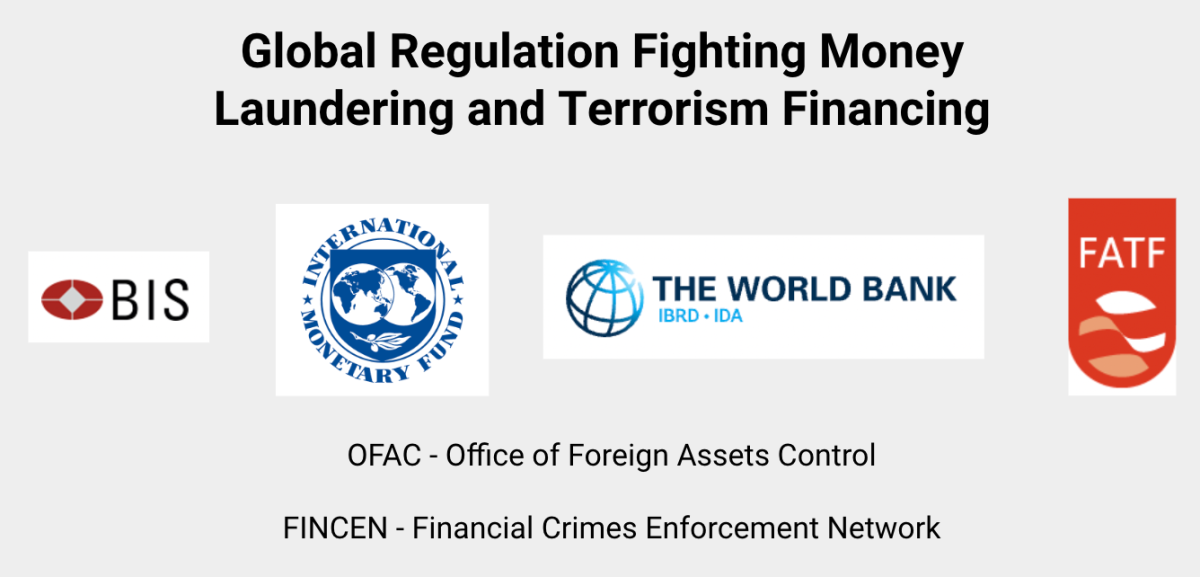
สถาบันข้างต้นเกิดขึ้นได้อย่างไร? เป็นเรื่องน่าสนใจที่จะได้เห็นภูมิหลังขององค์กรที่ทำการตัดสินใจเพื่อกำหนดความแตกต่างระหว่างสิ่งที่มีและสิ่งที่ไม่มี
BIS: ธนาคารกลางของธนาคารกลาง
BIS คือสถาบันการเงินระหว่างประเทศ ที่เป็นเจ้าของโดย ธนาคารกลางที่”ส่งเสริมความร่วมมือทางการเงินและการเงินระหว่างประเทศ และทำหน้าที่เป็นธนาคารสำหรับธนาคารกลาง”ข้อสังเกตที่น่าสนใจ: BIS ไม่ควรมีอยู่อีกต่อไปหากมีไว้สำหรับสมาชิกของการประชุม Bretton Woods
BIS ก่อตั้งขึ้นในยุโรปในปี 1930 ในช่วงสงครามโลกครั้งที่สอง BIS ช่วยให้ชาวเยอรมันถ่ายโอนทรัพย์สิน จากประเทศที่ถูกยึดครอง ความจริงที่ว่านักอุตสาหกรรมและที่ปรึกษาระดับสูงของเยอรมันนั่งอยู่ในคณะกรรมการ BIS ดูเหมือนจะให้หลักฐานเพียงพอว่า อดอล์ฟ ฮิตเลอร์ ตลอดช่วงสงคราม ด้วยความช่วยเหลือของธนาคารอเมริกัน อังกฤษ และฝรั่งเศส ระหว่างปี พ.ศ. 2476 ถึง พ.ศ. 2488 คณะกรรมการบริหาร BIS ได้รวมพวกนาซีหลายคน เช่น เจ้าหน้าที่นาซีคนสำคัญ Emil Puhl รับผิดชอบในการประมวลผลทองคำทางทันตกรรมที่ขโมยมาจากเหยื่อในค่ายกักกัน ผู้อำนวยการทั้งหมดนี้ ภายหลังถูกตัดสินว่ามีความผิดในคดีอาชญากรรมสงครามหรืออาชญากรรมต่อมนุษยชาติ
ด้วยเหตุนี้ การประชุม Bretton Woods จึงเพื่อเป็นข้อเสนอของนอร์เวย์สำหรับ“การชำระบัญชีของธนาคาร เพื่อการตั้งถิ่นฐานระหว่างประเทศโดยเร็วที่สุด” ยิ่งไปกว่านั้น เมื่อกองทุนการเงินระหว่างประเทศได้รับการจัดตั้งขึ้นแล้ว BIS ก็ดูจะยิ่งฟุ่มเฟือยมากขึ้นไปอีก
แต่แรงผลักดันในการยุบ BIS ได้จางหายไปหลังจากที่ประธานาธิบดีแฟรงกลิน รูสเวลต์ของสหรัฐฯ ถึงแก่อสัญกรรมในเดือนเมษายน พ.ศ. 2488 ภายใต้การสืบทอดตำแหน่งของเขา แฮร์รี เอส. ทรูแมน เจ้าหน้าที่ระดับสูงของสหรัฐฯ ที่วิพากษ์วิจารณ์ BIS มากที่สุด ออกจากตำแหน่งภายในปี 2491 เลิกชำระบัญชี.
FATF: The Financial Action Task Force
FATF เป็นองค์กรระหว่างรัฐบาล ก่อตั้งขึ้นในปี 1989 ตามความคิดริเริ่มของ G7 ในการพัฒนานโยบายเพื่อต่อต้านการฟอกเงิน หลังจากการโจมตีของผู้ก่อการร้ายเมื่อวันที่ 11 กันยายนในสหรัฐอเมริกาในปี 2544 ได้ถูกขยายเป็น รวมการสนับสนุนทางการเงินแก่การก่อการร้าย
ตั้งแต่ปี 2000 FATF ได้คงไว้ซึ่ง บัญชีดำของ FATF และบัญชีดำของ FATF นี่คือรายชื่อประเทศที่ FATF พิจารณาว่าไม่ให้ความร่วมมือและขาดความพยายามระดับโลกในการต่อสู้กับการฟอกเงินและการสนับสนุนทางการเงินแก่การก่อการร้าย แม้ว่าภายใต้กฎหมายระหว่างประเทศ บัญชีดำของ FATF จะไม่ได้รับการคว่ำบาตรอย่างเป็นทางการ แต่ในความเป็นจริงแล้ว สมาชิกบัญชีดำของ FATF มักตกอยู่ภายใต้แรงกดดันทางการเงินที่รุนแรง
การยอมรับความเสียหายจากบุคคลที่ถูกยกเว้นจำนวนสองพันล้านคน
ผลกระทบต่อผู้คนในประเทศเหล่านี้มีมาก การลงโทษมักจะทำร้ายคนจนและกลุ่มเปราะบางที่สุดเสมอ ผู้มีอำนาจหาทางออก ตัวอย่างเช่น FATF ทำให้องค์กรพัฒนาเอกชน (NGO) ในประเทศเหล่านี้เข้าถึงกองทุนเพื่อช่วยเหลือในสถานการณ์บรรเทาทุกข์ได้ยาก เนื่องจากเกณฑ์ของ FATF ที่เข้มงวด คำแนะนำของ FATF ไม่ได้กำหนดข้อจำกัดสำหรับองค์กรพัฒนาเอกชนโดยเฉพาะ
อ้างอิงจาก Wikipedia:
“ในเอกสารฉบับปี 2020 Ronald Pol ระบุว่าในขณะที่ FATF ประสบความสำเร็จอย่างมากในการทำให้นโยบายเป็นที่ยอมรับทั่วโลก ผลกระทบที่แท้จริงของนโยบายเหล่านั้นค่อนข้างน้อย: ตามการประมาณการของ Pol น้อยกว่า 1% ของกำไรที่ผิดกฎหมายถูกยึด โดยค่าใช้จ่ายในการดำเนินนโยบายสูงกว่าอย่างน้อยหนึ่งร้อยเท่า Pol เชื่อว่าอุตสาหกรรมและผู้กำหนดนโยบายมักเพิกเฉยต่อสิ่งนี้ แทนที่จะประเมินนโยบายตามเมตริกความสำเร็จซึ่งส่วนใหญ่ไม่เกี่ยวข้อง”
สหรัฐอเมริกาถูกโจมตีในปี 2544 และในปีต่อๆ มา ได้มีการเสริมสร้างกฎระเบียบเพื่อต่อต้านการก่อการร้ายที่แผ่ขยายไปยังเขตอำนาจศาลเกือบทั้งหมดในโลก ส่งผลให้ประชาชนที่ไม่ได้ลงทะเบียนและไร้สัญชาติหลายพันล้านคนไม่สามารถจัดตั้ง บัญชีธนาคาร หางาน ซื้อบ้าน หรือเริ่มต้นธุรกิจ นอกจากนี้ คนเหล่านี้ยังยากจน คนชายขอบ ถูกเลือกปฏิบัติ ไม่ได้รับสิทธิ์ และถูกกีดกันทางการเมือง
ตัวอย่างเช่น มี Winnet Zhamini อายุ 33 ปีและคุณย่า เธอเป็นหนึ่งในชาวซิมบับเว 300,000 คน ที่ไม่สามารถเข้าถึงบัญชีธนาคารได้ เนื่องจากเธอไม่มีเอกสารประจำตัว อย่างที่เธอบอก The Guardian:
“ฉันไม่เคยมีสูติบัตรหรือบัตรประจำตัว พ่อของฉันเป็นชาวมาลาวีและตั้งรกรากที่นี่ในช่วงทศวรรษที่ 70 เมื่อเราเกิดมาเราไม่เคยมีโอกาสได้รับสูติบัตร แม่ของฉันซึ่งเป็นชาวซิมบับเวเสียชีวิต พ่อของฉันเพิ่งหายตัวไป สามีของฉันทิ้งฉันไปเพราะฉันไม่มีรายละเอียดใดๆ พี่สาวของฉันแต่งงานและมีลูกสี่คน แต่สามีไล่เธอไปเพราะเธอไม่มีบัตรประชาชน ฉันไม่สามารถซื้อซิมการ์ดได้ ฉันไม่สามารถหางานได้ ฉันยังชีพด้วยการซักผ้า แต่เราถูกเอาเปรียบเพราะไม่มีทางเลือก”
องค์กรเหล่านี้กำลังบังคับให้ทุกคนเข้าสู่กฎระเบียบและระบบราชการที่ครอบคลุม ซึ่งช่วยให้สามารถควบคุมในระดับปัจเจกบุคคล ซึ่งนำไปสู่การกีดกันทางการเงินและการกดขี่ผู้คนหลายพันล้านคน
ข้อมูลที่รวบรวมโดยเจ้าหน้าที่ถือเป็นแหล่งล่อลวงสำหรับแฮ็กเกอร์ อาชญากรรมออนไลน์ และการขู่กรรโชก และทั้งหมดนี้เพื่อค้นหาไม่กี่คนที่ฟอกเงินหรือสนับสนุนการก่อการร้ายอย่างแท้จริง แทนที่จะเฝ้าระวังทั่วไป ทำไมไม่เน้นและกำหนดเป้าหมายเพียงไม่กี่คน มันเป็นวงจรอุบาทว์ การลงโทษ กฎระเบียบที่ครอบคลุม และการควบคุมทางการเงินคือเหตุผลที่ผู้คนต้องการ Bitcoin
Bitcoin บังคับใช้ปฏิญญาสากลว่าด้วยสิทธิมนุษยชนอย่างไร
ระบอบการกำกับดูแลทั่วโลกไม่รวม ประมาณ 1.7 พันล้านคน (อาจถึง 3 พันล้านถ้าคุณรวมเด็ก 2 คนโดยประมาณต่อผู้ใหญ่หนึ่งคน) จากการมีบัญชีธนาคาร ซึ่งนำเราไปสู่ปฏิญญาสากลว่าด้วยสิทธิมนุษยชน และ 30 บทความ ฉันจะอ้างถึงเจ็ดบทความเหล่านี้เพื่อแสดงให้เห็นว่า Bitcoin สนับสนุนสิทธิมนุษยชนอย่างไร
บทความที่หนึ่ง: สิทธิในความเท่าเทียมกัน
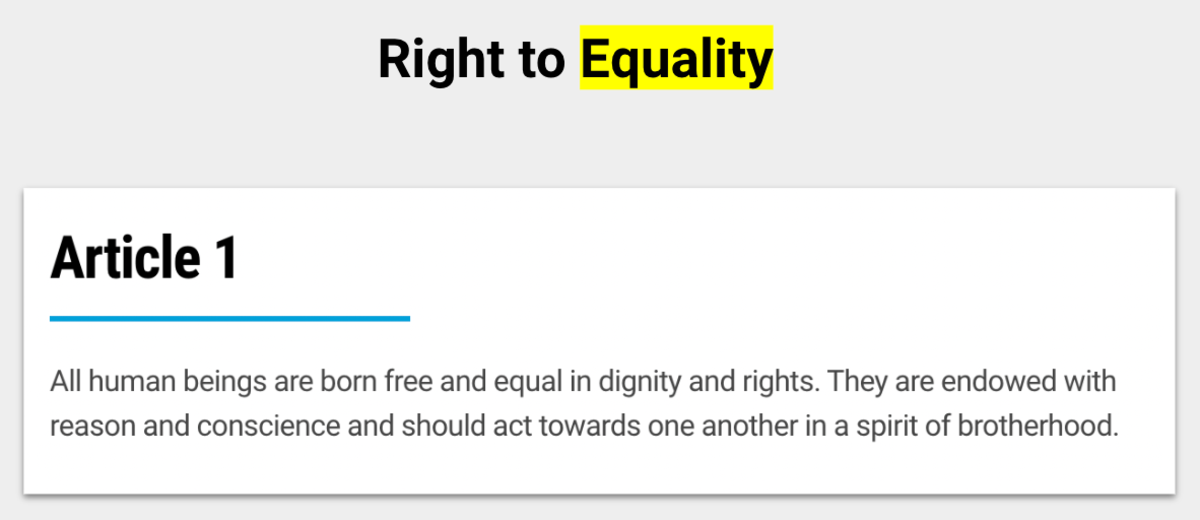
สิทธิมนุษยชนนี้แนะนำให้เราทุกคนเกิดมามีอิสระที่จะได้รับเกียรติและสิทธิต่างๆ แต่นี่ไม่ใช่กรณีทางการเงินอย่างแน่นอน ผู้คนหลายพันล้านคนที่ยากจนเกินไปหรือไม่มีบัตรประจำตัวถูกกีดกันจากบริการทางการเงิน จากจำนวน 1.7 พันล้านคนที่ไม่มีบัญชีธนาคาร (มีเฉพาะหัวหน้าครอบครัวเท่านั้น รวมถึงครอบครัวด้วย และอื่นๆ) 980 ล้านคนเป็นผู้หญิง
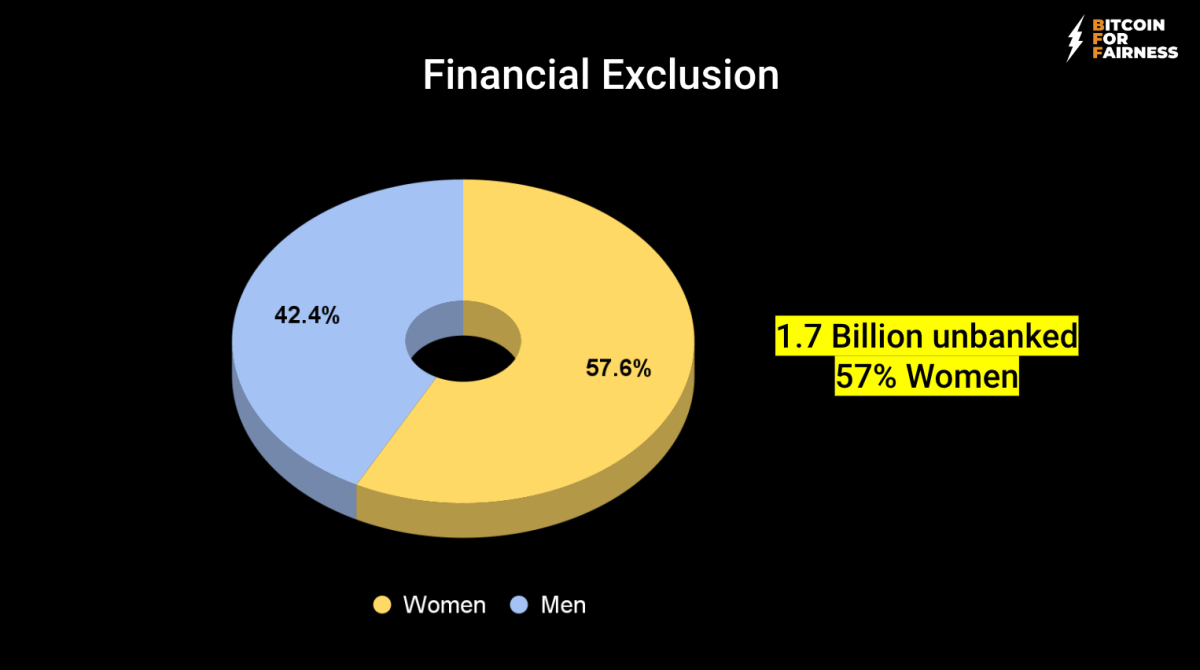
คนที่ไม่มีบัญชีธนาคารไม่สามารถเก็บเงินสดไว้อย่างปลอดภัยได้เนื่องจากความเสียหายที่อาจเกิดขึ้นจากสัตว์ เช่น หนู หรือเพราะมันทำให้พวกเขาตกเป็นเป้าของการปล้น และพวกเขาไม่สามารถยืมเงินได้ มิฉะนั้นพวกเขาจะตกเป็นเหยื่อของฉลามเงินกู้
ในฐานะเหยื่อเงินกู้ชาวไนจีเรีย ได้กล่าว:
“ในวันสุดท้ายของเดือนกุมภาพันธ์ (2022) ฉันยืม N18,000 ($43) จากแอป Soko-loan ที่ฉันเห็นบน Facebook ในระหว่างการสมัคร แอปแสดง 92 วันเป็นระยะเวลาเงินกู้ขั้นต่ำ แต่หลังจากที่ฉันส่งข้อมูลของฉัน ฉันเห็นอัตราดอกเบี้ย (ประมาณ) 45% เป็นเวลา 14 วัน!”
วิธีแก้ปัญหาไม่ใช่ข้อบังคับเพิ่มเติม แต่เปิดให้เข้าถึงเงินที่ปลอดภัยและกระจายอำนาจ
การไม่รู้หนังสือทางการเงินและการกีดกันสาเหตุความมั่งคั่ง
หากคุณจัดการเพื่อ มี ID และเข้าถึงบัญชีธนาคารหรือบริการเงินผ่านมือถือในแอฟริกา แต่ก็ไม่ได้หมายความว่าคุณสามารถเข้าถึงได้ง่ายหรือส่งเงินให้ใครบางคนในประเทศของคุณเองหรือในต่างประเทศ เทปสีแดง โครงสร้างพื้นฐานด้านไอทีที่ใช้งานไม่ได้หรือไม่มีอยู่จริง และค่าธรรมเนียมที่สูง ทำให้หลายคนเลิกใช้บัญชีเหล่านั้น แม้ว่าจะมีบัญชีธนาคารอยู่ก็ตาม
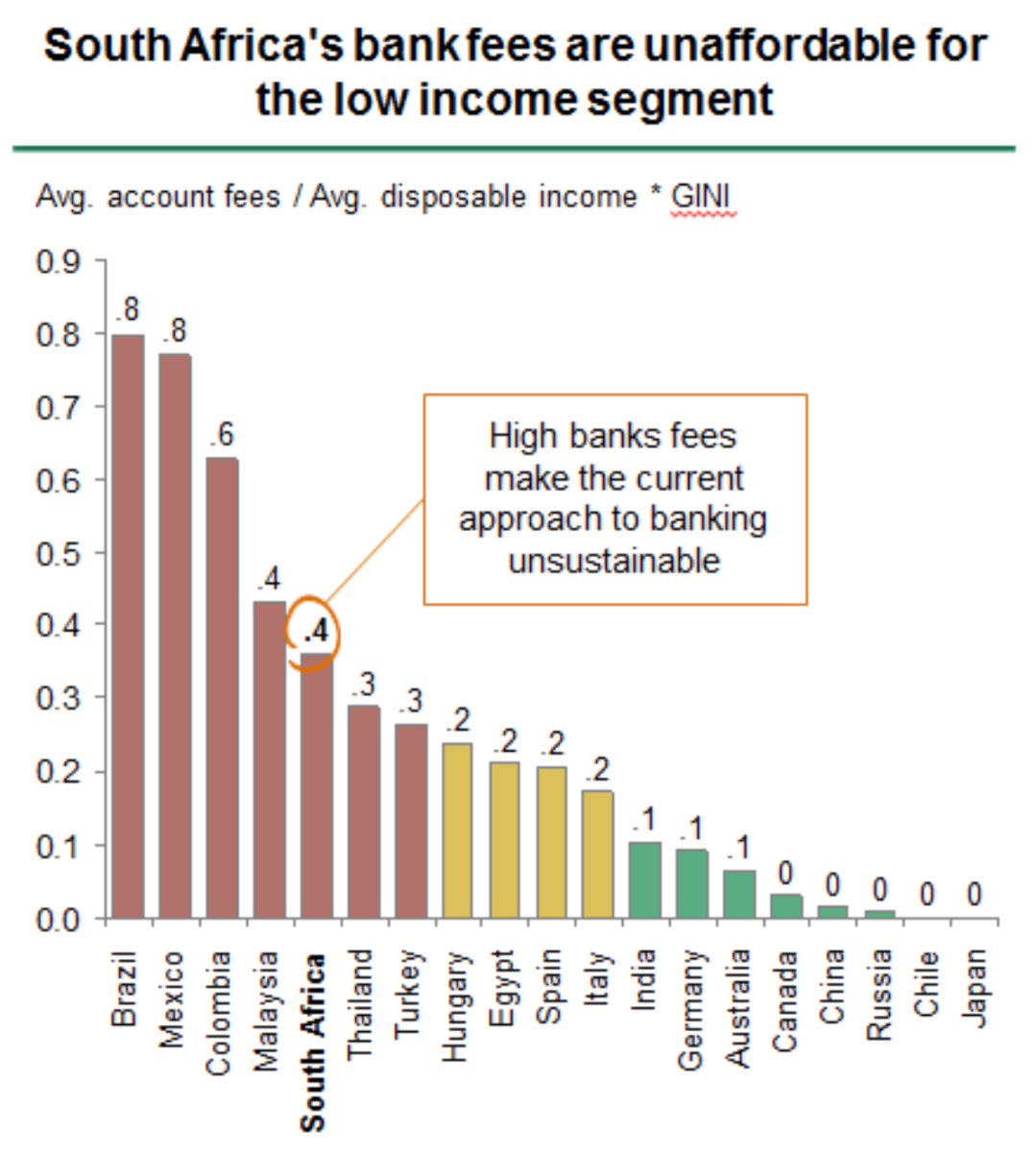
เช่น โครงสร้างค่าธรรมเนียมของธนาคารในแอฟริกาใต้สูงกว่าในประเทศดังกล่าวถึงสี่เท่า อย่างเยอรมนี ออสเตรเลีย และแม้แต่อินเดีย หลายคนเต็มใจที่จะเสี่ยงกับการสูญหายและการโจรกรรมที่เกี่ยวข้องกับเงินสดเพื่อหลีกเลี่ยงค่าธรรมเนียมและเทปสีแดง
ผู้ที่มีรายได้น้อยมีความไม่ไว้วางใจอย่างลึกซึ้งต่อภาคการเงินที่เป็นทางการ ซึ่งมีรากฐานมาจากความกลัว ของการแสวงประโยชน์ Past abuses, such as the inappropriate marketing and selling of financial products, have shown that poor people are highly susceptible to rapacious commercial interests.
Africa’s poor are particularly vulnerable due to widespread financial illiteracy, exacerbating the sense of mistrust and levels of exploitation fostered by these practices. Unfortunately, this is a systemic education problem within Africa that cannot be addressed in the short term.
This is also a problem with all crypto tokens and outright scams as well. Bitcoin educators must make the difference between centralized institutions and the internet protocol of money clear to the people. Education is key, especially when the existing system must not be copied into the future, which was the goal of Bitcoin and Satoshi Nakamoto in the first place.
“The root problem with conventional currency is all the trust that’s required to make it work. The central bank must be trusted not to debase the currency, but the history of fiat currencies is full of breaches of that trust. Banks must be trusted to hold our money and transfer it electronically, but they lend it out in waves of credit bubbles with barely a fraction in reserve. We have to trust them with our privacy, trust them not to let identity thieves drain our accounts.”
Monetary Colonialism
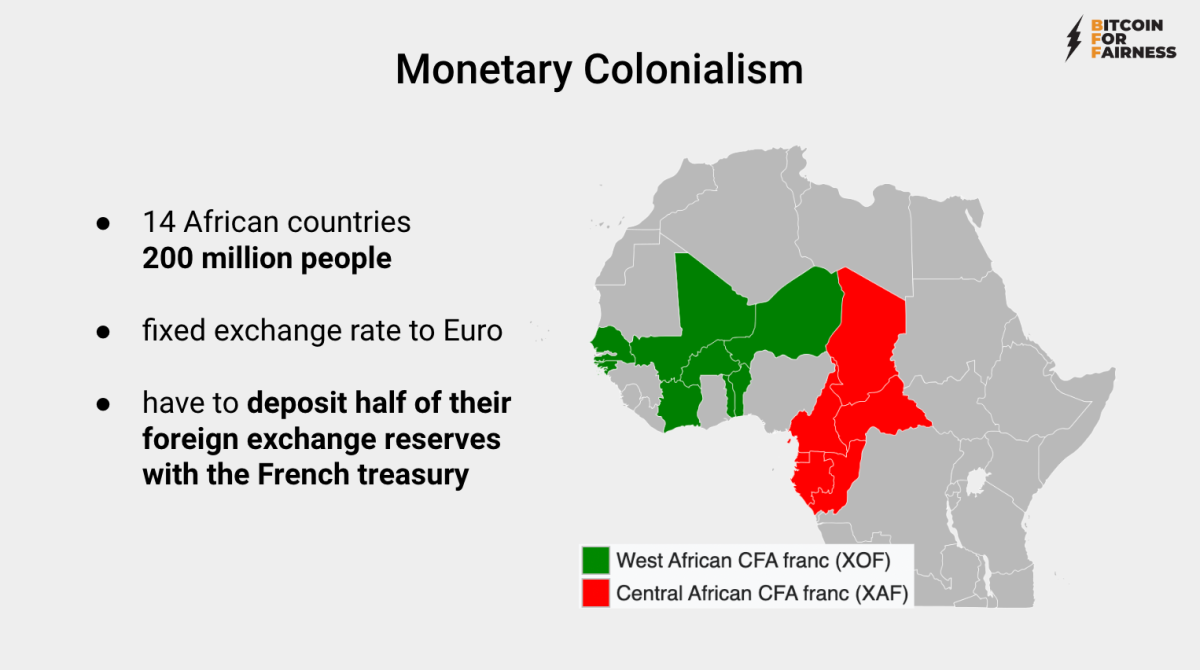
Fourteen African countries which were colonized by France with about 200 million inhabitants are still obliged to use the Central African franc and the West African franc, collectively known as the CFA franc. The CFA franc is legal tender and is pegged to the euro. The countries must deposit half of their foreign exchange with the French Treasury. Although these countries have been independent for decades, they don’t have financial sovereignty. That’s not independence, that’s monetary colonialism.
Inflation Is Hidden Tax
For the first time since the 1920s, Austrians and Germans are feeling the impact of inflation. Ten percent was the peak in November 2022. Energy prices in Europe are skyrocketing. Friends in Austria are telling me that they won’t heat their flats this winter and are buying cheap food. They have “middle-class” jobs, they are well educated. Ten to 20 years ago, the jobs they are doing were paying enough to buy an apartment on credit, own a car and go on a holiday trip with the family. Those days are over.
Compared to countries like Zimbabwe with 500% inflation, or Cuba with 135%, Turkey with 73.5% and so on, this is still bearable. Being in Zimbabwe, I always wonder how people survive these difficulties. The current inflation is only topped by the hyperinflation in Zimbabwe around 2008 when the highest-denominated banknote was “worth” $100 trillion.
Just imagine that the value of your money is decreasing by 500% per month. The salaries of civil servants, doctors and teachers in Zimbabwe are around $300 per month, and they are paid in the Zimbabwe dollar. Saving money is completely impossible. Either you spend it immediately or you try to find someone who wants to exchange it to the U.S. dollar. Every day is centered around money management. “What is the rate today?” might be the most used question after “Hello, how are you?” in Zimbabwe, followed by the decision of “in which currency am I going to pay?”
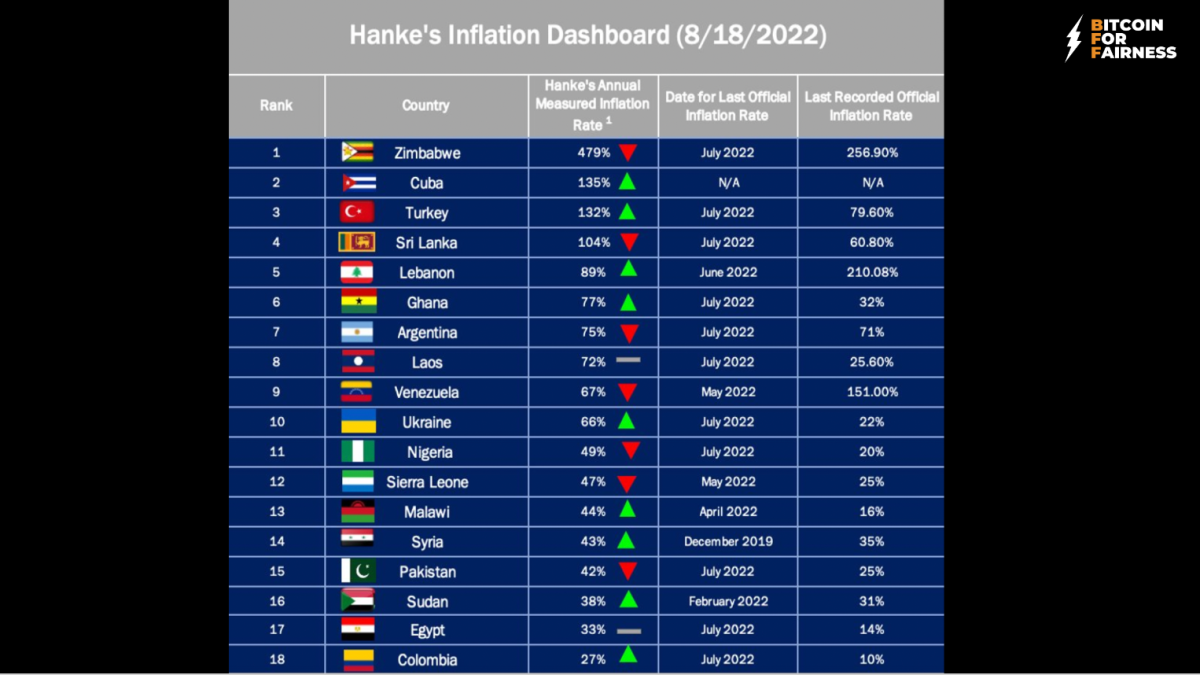
One of the reasons for the high inflation in Zimbabwe is excessive money printing.
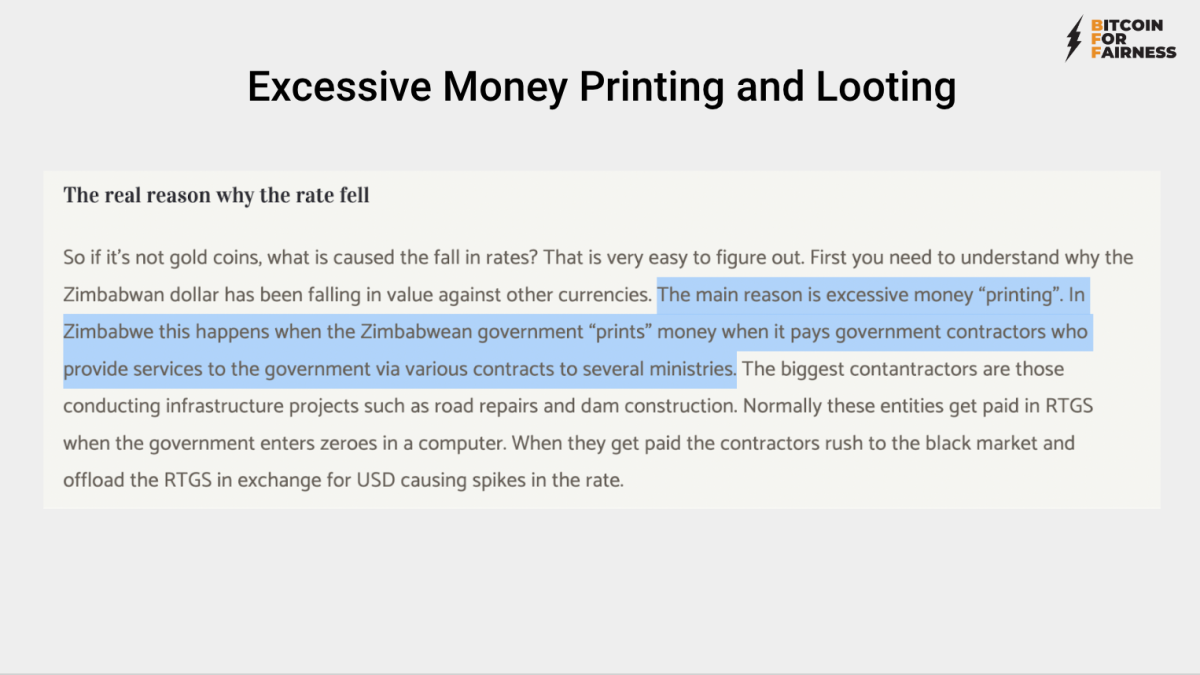
During my first visit to Zimbabwe in 2020 I put together a podcast series where I documented the financial situation of people and if and how Bitcoin can be used to fight inflation and corruption. My conclusion was that Zimbabwe sadly is a kleptocracy, the elites are corrupt and loot all money from the people.
How Bitcoin Fixes Inflation From Money Printing
There will only ever be 21 million bitcoin. When I mention that in my talks in Zimbabwe, people immediately understand the use case. There will be no monetary inflation, which would render bitcoin to have less value. Yes, bitcoin’s value is volatile, that’s because its price is determined by supply and demand and there is simply not enough demand yet to stabilize the value. But nobody can inflate the maximum amount of bitcoin that will be available. Bitcoin can also not be forged like cash or gold.
Corruption
Speaking of corruption and gold. Corruption is abuse of entrusted power for private gain. In Zimbabwe, the ruling elites are behind its disappearing gold. Every year, gold worth $1.5 billion is being looted.
At the same time, Zimbabwe’s once enviable healthcare sector is collapsing under the weight of dilapidated infrastructure, a lack of drugs and poorly-paid staff going on frequent strike. Pregnant women are being forced to pay bribes to get help with giving birth, with reports of babies being born in queues outside maternity clinics. People are dying in traffic every day due to the poor condition of streets, while the government and ministers are rewarding themselves with new luxury cars.
Not only in Zimbabwe is corruption a huge problem. Almost every authoritarian-led country has a high level of corruption. Corruption erodes trust, weakens democracy, hampers economic development and further exacerbates inequality, poverty, social division and the environmental crisis.
How Bitcoin Fixes Corruption
The Bitcoin blockchain is a transparent ledger of all transactions that took place since Bitcoin started publicly on January 3, 2009. That means that budgets for ministries or projects can be audited. With multisignature wallets, the possibility to steal funds shrinks. This would only be possible if all signers were to collude.
But this doesn’t contradict the privacy-preserving properties of Bitcoin. If you choose to make a budget auditable, you can. The private keys give you the possibility to stay private or to reveal data. If you self custody your bitcoin, you decide. This is how Bitcoin empowers individuals and keeps authorities in check.
How Bitcoin Fixes the Right to Equality
Bitcoin is a neutral, global, borderless money. As an open protocol, it can be used by anyone. No one can be excluded and everyone is treated the same. Bitcoin gives self sovereignty on a personal and national level. Bitcoin doesn’t care where you were born. Suffering a high amount of inflation and corruption is a result of the misfortune of your birth location.
Article 12: The Right To Privacy
You read that correctly: privacy is one of the human rights mentioned in the declaration. How can it be that our privacy is highly infringed not only by companies like Facebook, but also by the regulatory authorities? In the name of preventing money laundering and child abuse, we’re all under constant surveillance.
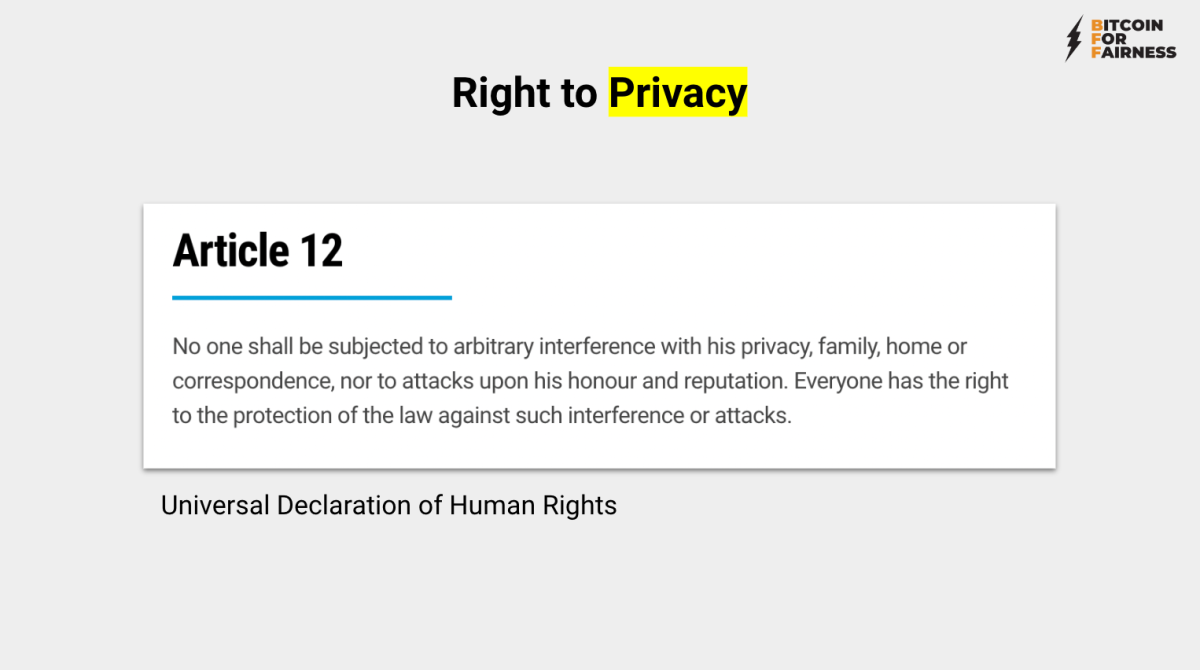
Financial surveillance and control seem to be the goals of institutions like the BIS. In 2021, the general manager, Agustín Carstens, said in regards to central bank digital currencies (CBDCs):
“We don’t know who’s using a $100 bill today and we don’t know who’s using a 1,000 peso bill today. The key difference with the CBDC is, the central bank will have absolute control on the rules and regulations that will determine the use of that expression of central bank liability, and also we will have the technology to enforce that.”
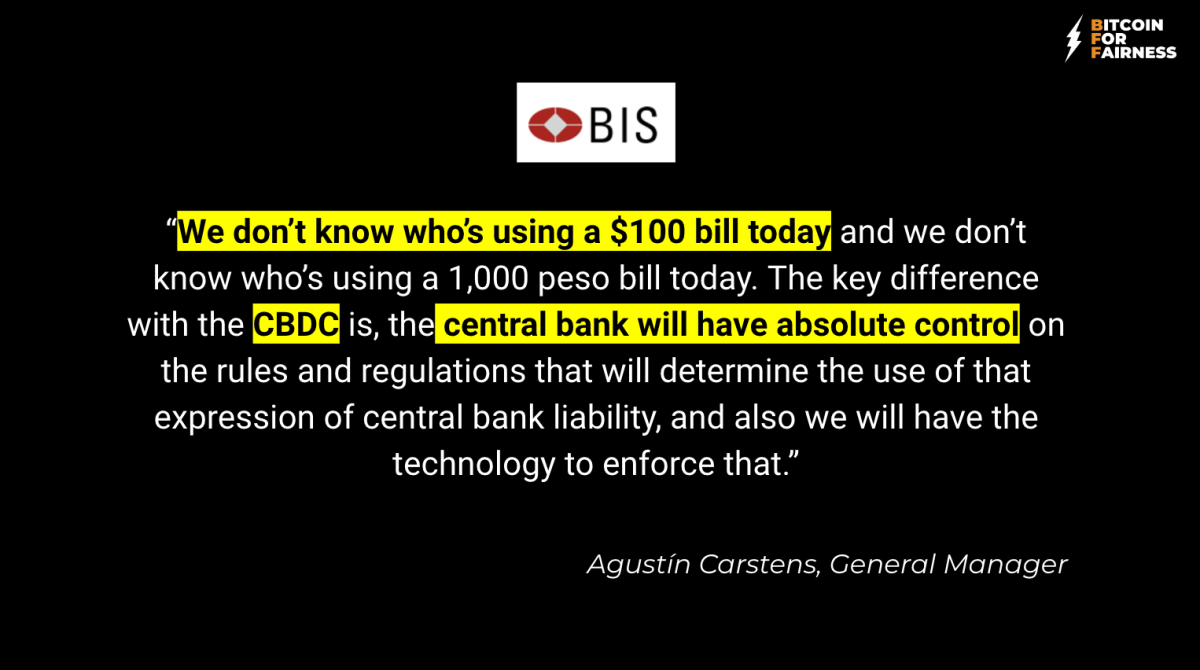
Yet people argue with me, saying things like, “But I’ve got nothing to hide, it’s OK, we need this control to fight criminals.”
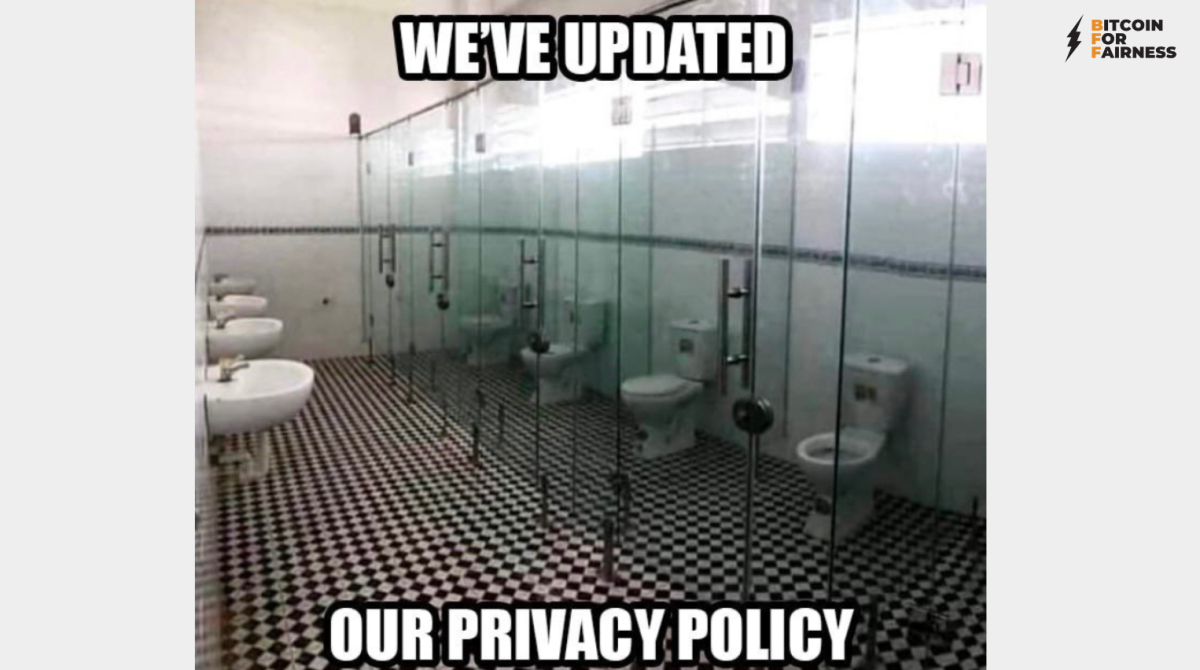
It’s not about hiding something. Source.
My answer: it’s not about having nothing to hide! Alone, this idea is pushing human rights activists, lesbians and gays, opposition members and so on under the suspicion that they have something to hide. No, they do not have anything to hide. Nonetheless, they are targets of violence, intimidation and prison and are facing death in many countries. That’s the reason why privacy is important.
Even more so, it’s important that everyone is using privacy protection. The more people who care about privacy, the better protected freedom fighters and vulnerable groups are. This means that more privacy protection needs to be included in Bitcoin at the blockchain level. Less-wealthy people can’t afford a VPN service that costs $10 per month. They use what they get for free.
Many millions are on Facebook and WhatsApp in Africa. ทำไม Because it’s the only option they have. The cheapest option that telecom providers there offer are “social media” bundles. That’s why thousands of people believe that Facebook is the internet. We shouldn’t repeat that mistake. But we’re on the brink. Luno, Binance and Coinbase are well-known brands in Africa. Most people believe that one needs to use an exchange or a bank to be able to use Bitcoin, and not only in Africa. I’ve heard that several times from people.
Privacy is a luxury for most Africans. They are even more prone to data collection and abuse.
How Bitcoin Fixes The Right To Privacy
Bitcoin’s privacy isn’t perfect, yet. New technologies like PayJoins or Confidential Transactions will hopefully be implemented in the coming years. Payments on the Lightning Network are more private already. Wrapped Lightning invoices protect the recipient from being identified by custodians. With CoinJoins, you can already achieve a high level of privacy. In the future, this kind of protection needs to be the standard.
Still, since Bitcoin is pseudonymous and many people in African countries use it peer to peer without know-your-customer (KYC) identification, it gives them more privacy than their bank or mobile money provider. In Zimbabwe, all digital transactions are automatically taxed at 4%. Every payment is traceable by the government since mobile money transactions are moving from one SIM card to the other and SIM users are registered.
Privacy is never zero or one. It’s on a scale. The privacy possible while using Bitcoin is higher than that of your credit card, but lower than that of using cash. There is definitely a lot of work to be done and it’s important to make Bitcoin on the base chain more private. But Bitcoin gives you plausible deniability already now. It protects one from being an easy target.
Article 19: Freedom Of Speech
Funding the opposition in Zimbabwe? Supporting a gay rights group in Saudi Arabia? Protesting against China in Hong Kong? Donating toward Ukrainian refugees? Then you’re sharing your opinion with the world through your financial transactions. If you can’t send money to an abortion clinic in the U.S. for fear of being prosecuted, then your freedom of speech has been taken away.
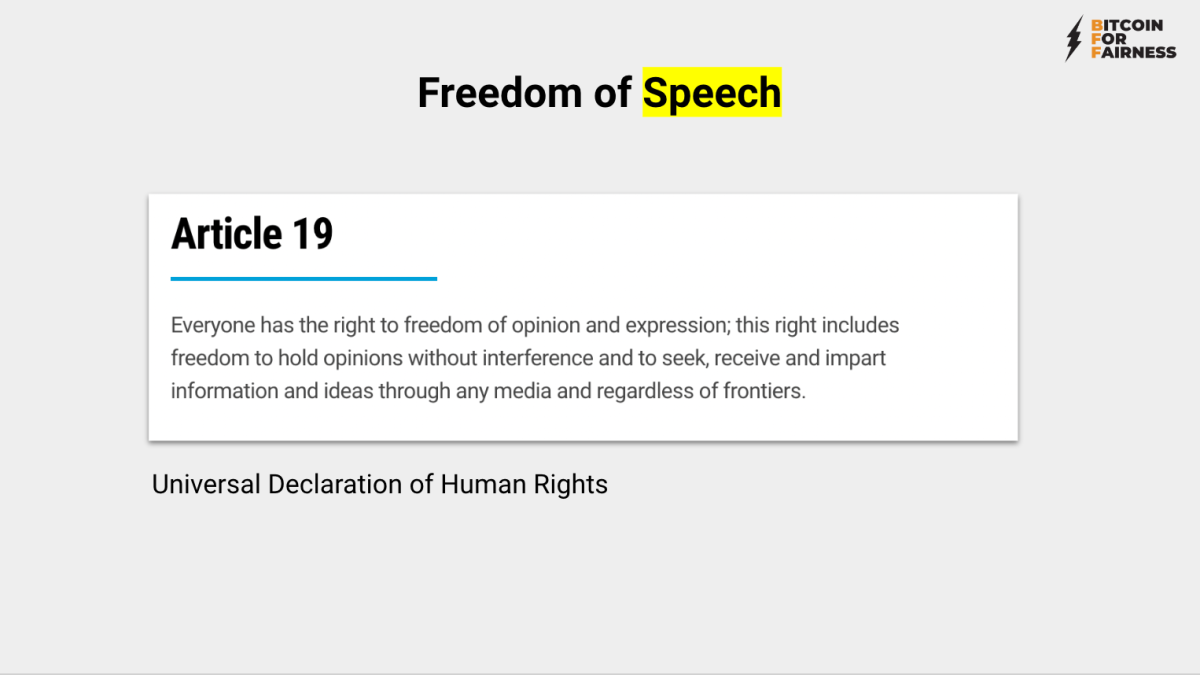
Similar cases to the below are not unique to Zimbabwe, but that is just the country I visited for the longest period. The young man pictured on the left was brutally murdered because he was an activist. The man pictured on the right was arrested because he was wearing a yellow t-shirt. Yellow is the color of the opposition, and wearing yellow was forbidden by the government.
“Even schoolchildren have not been spared with reports suggesting that schools with yellow uniforms have been directed to abandon them and pick different colours,” ZimEye reported.
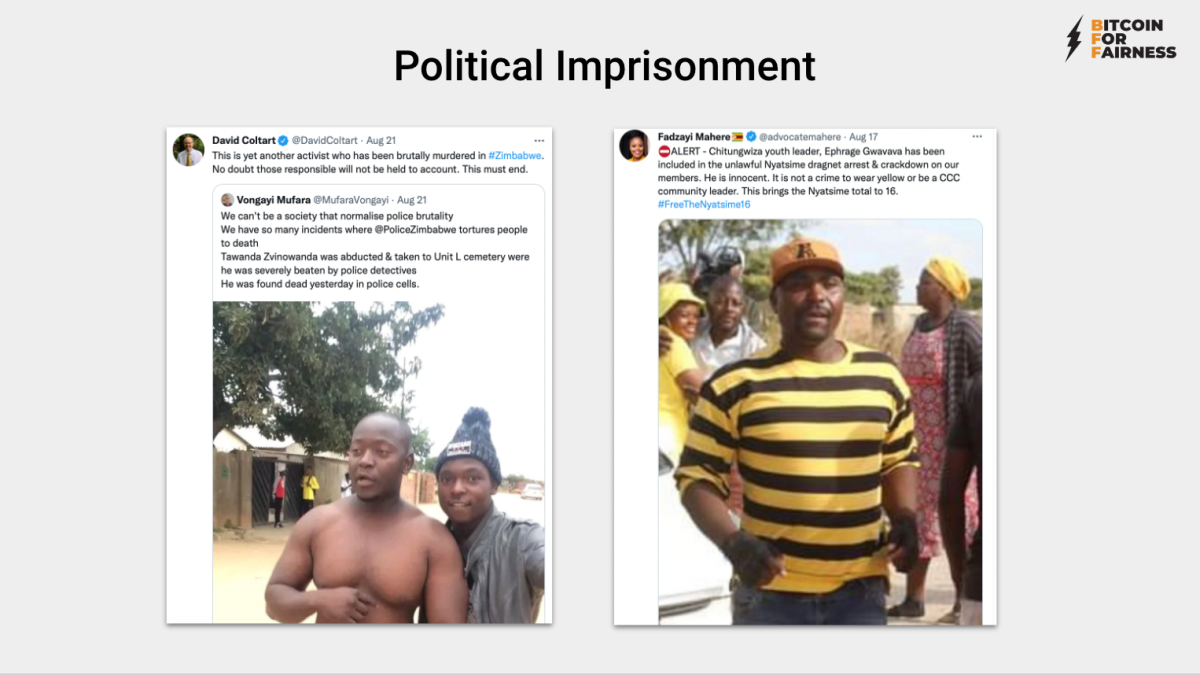
How Bitcoin Fixes Freedom Of Speech
Bitcoin transactions are uncensorable. Used the right way, Bitcoin gives you enough privacy to express your opinion (I’m not talking about any privacy it may grant for committing crimes).
Article 20: Freedom Of Association
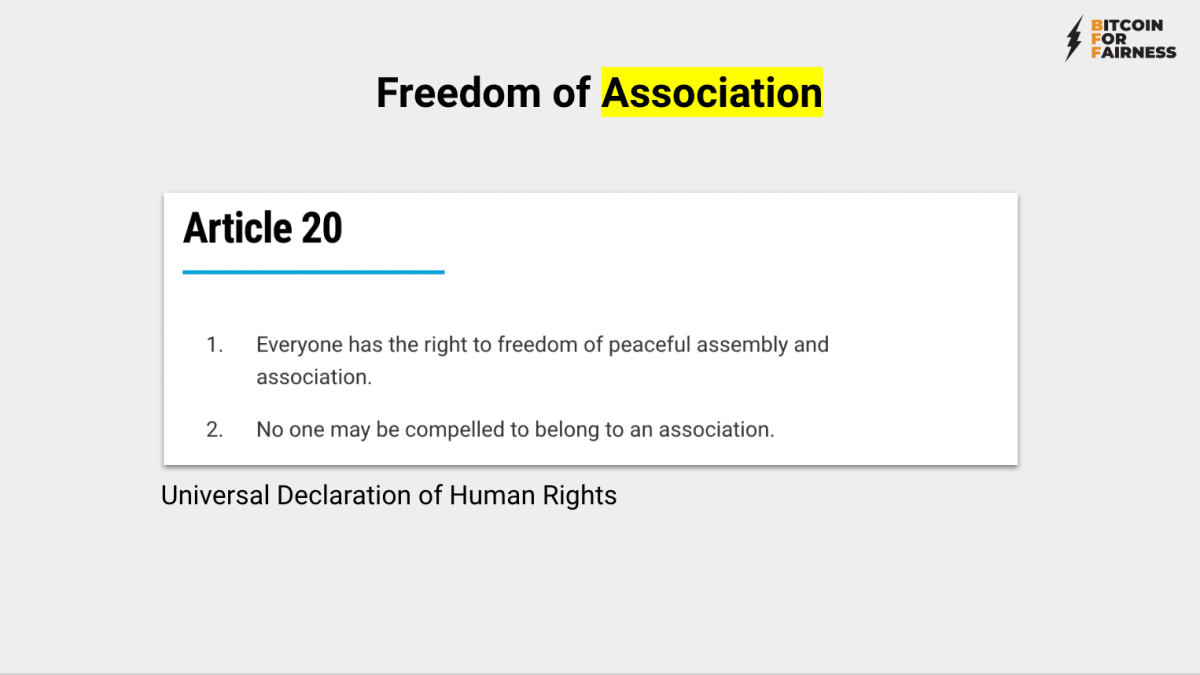
Freedom of speech goes hand in hand with freedom of association. If you can’t express your political opinion, if you can’t meet with your fellow demonstrators or freedom fighters because of financial surveillance, then you’re stripped from political power. If your activism endangers the authoritarian powers, then they cut you off from your bank account.
This happened in Nigeria during the EndSARS movement which started in October 2020. The demonstrations against police brutality were supported by the Nigerian Feminist Coalition. They collected donations via their bank account and gave food, drinks and other needed support to the demonstrators, but not for long. The country’s central bank cut off their bank account. But the women remembered Bitcoin, the technology that works without banks. Tech savvy as they were, they set up a BTCPay Server instance and started collecting donations in bitcoin from all over the world.
How Bitcoin Fixes Freedom of Association
Bitcoin’s privacy and uncensorability enables people to cooperate against dictatorships. You simply can’t freeze a Bitcoin account, because there are no accounts. As long as you self custody your keys, no one can take your money away from you.
Article 2: Freedom From Discrimination
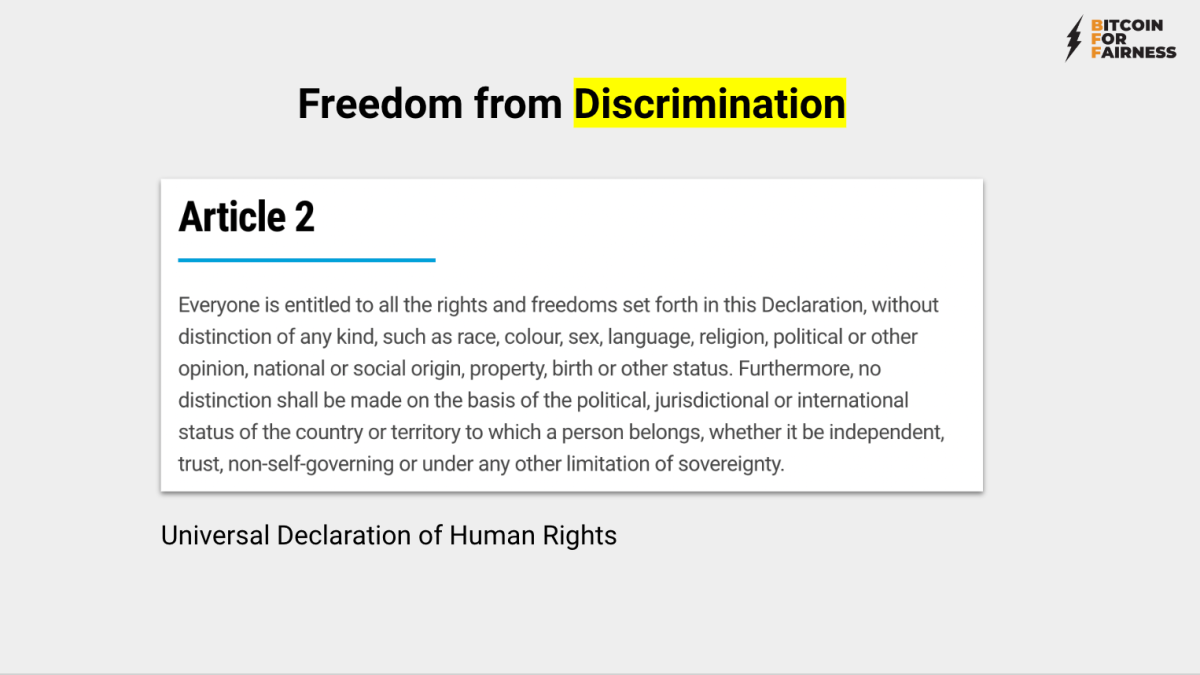
“Foreign exchange controls are imposed by a government on the purchase/sale of foreign currencies by residents, on the purchase/sale of local currency by nonresidents, or the transfers of any currency across national borders. Countries with weak and/or developing economies generally use foreign exchange controls to limit speculation against their currencies. They may also introduce capital controls, which limit foreign investment in the country.”
Thirty-one countries globally are imposing foreign exchange controls, such as Argentina, Ethiopia, Ghana, Nigeria, Russia, Ukraine, Venezuela and Zimbabwe, just to name a few. These discriminatory restrictions are financial oppression.
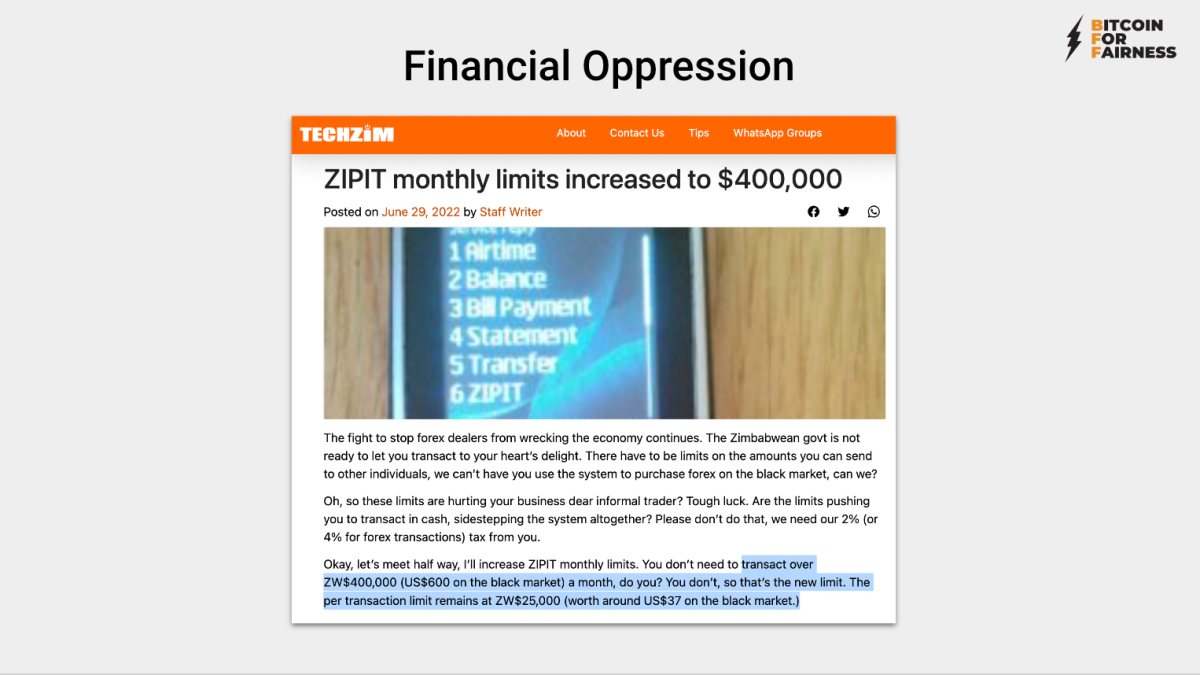
In Zimbabwe, for instance, online banking transactions are limited to $600 dollars per month. Per transaction you can only transfer $37. It’s basically impossible to run a business like that.
Another form of financial discrimination is the war on cash. In 2016, the Indian government and central bank withdrew the highest-denominated banknotes from one day to the other to fight money laundering and the black market. Hundreds of thousands of cash dependent people stormed banks and ATMs to exchange their banknotes. But, of course, ATMs were empty and it was a weekend.
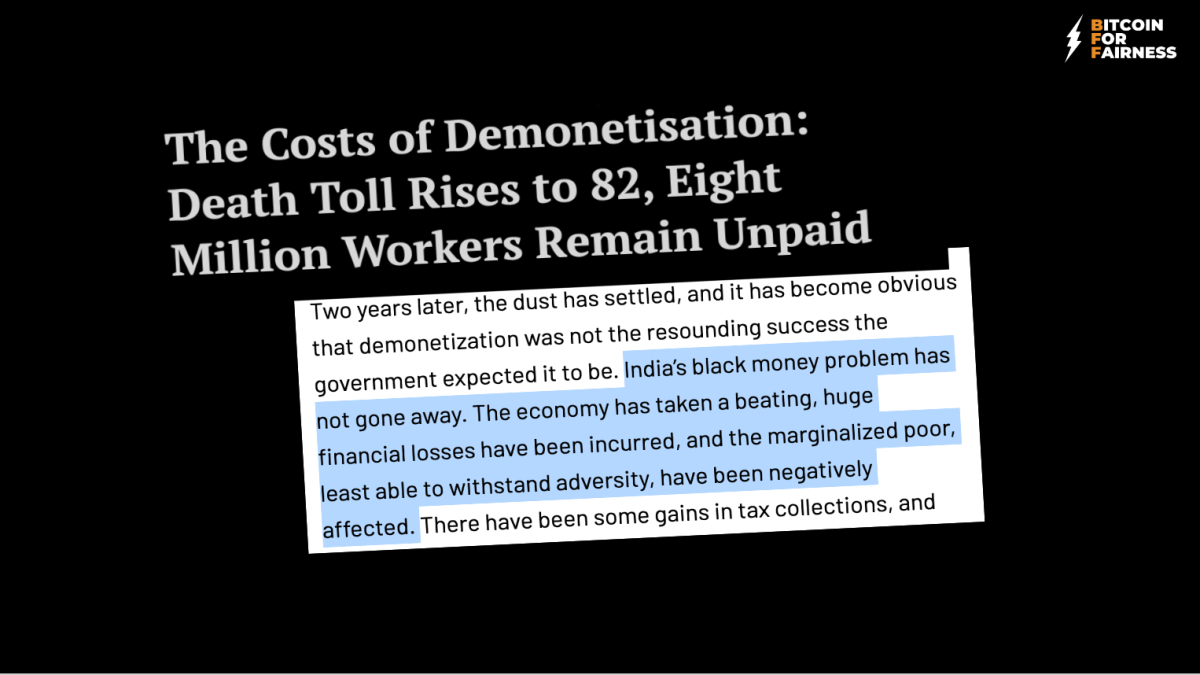
The result was that 82 people died and millions lost their money. And this overreach had seemingly zero positive effect, because two years later, the black market money problem still existed.
How Bitcoin Fixes Freedom From Discrimination
Bitcoin is permissionless. Anyone can use it, regardless of race, gender, status or wealth. Nobody can take it away from you. Since it’s a protocol controlled by code and machines, there can be no discrimination based on human prejudices.
Article 13: Freedom Of Movement
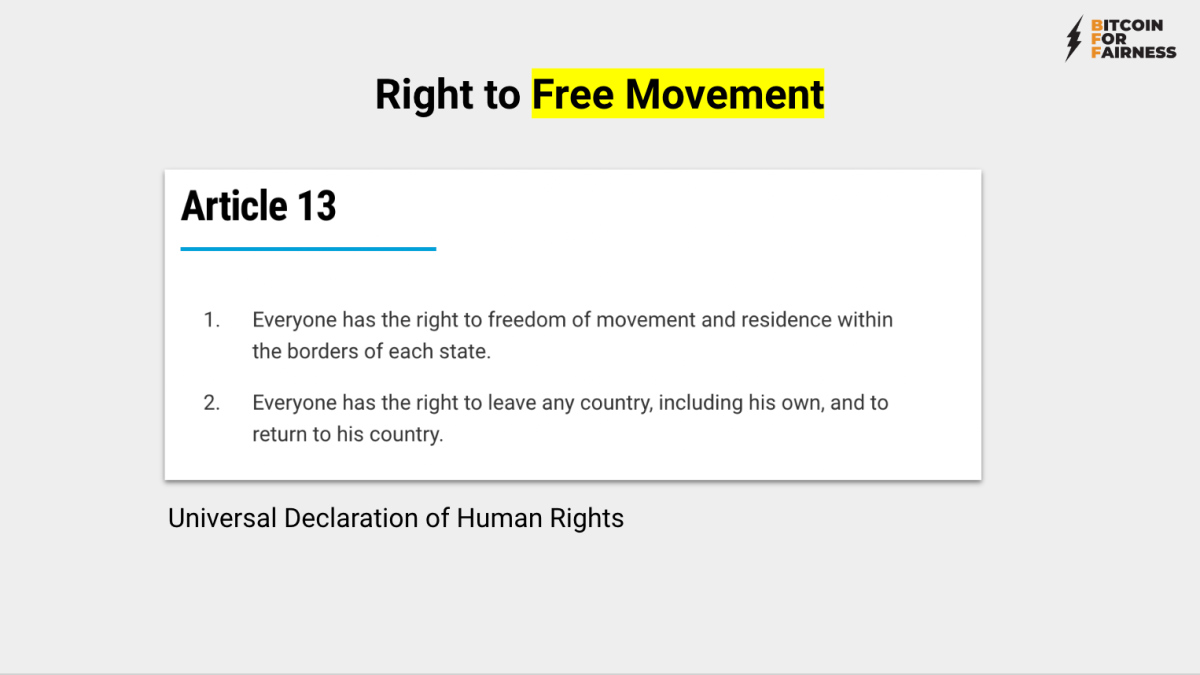
Most people don’t have the right to free movement — at least they aren’t welcome to arrive in many countries. Even if one is allowed to move freely, one can’t take all of their wealth with themselves.
Imagine you need to flee your home because of war or discrimination and persecution. You can’t just go to the bank and ask for all of your money and transfer it abroad. Foreign exchange controls and regulations ban the import of a stash of money higher than a few thousand U.S. dollars. If you own a house or land, you need to sell it and see how you can transfer it from one jurisdiction to the other.
How Bitcoin Fixes Freedom of Movement
Bitcoin is borderless. It enables free movement without losing all your wealth.
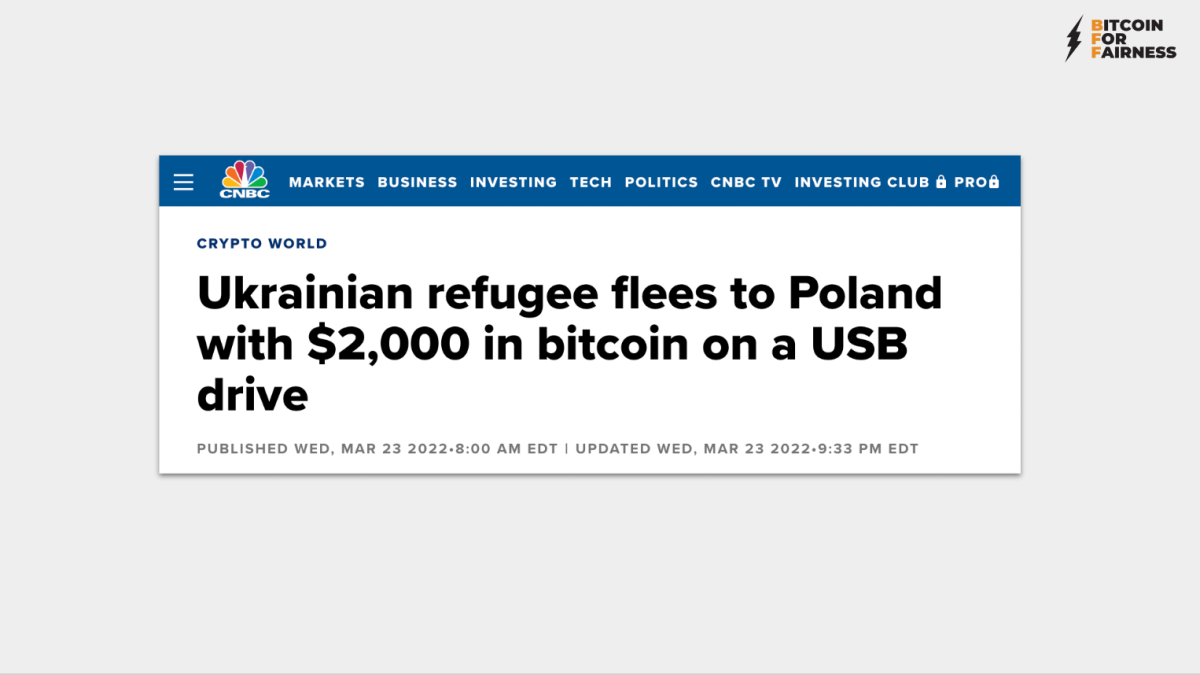
The Ukrainian referred to in the above headline was able to flee the war zone because they could take their bitcoin with them. In fact, you don’t even need a device to take all of your wealth with you. Memorize the 12 seed words to your Bitcoin wallet, throw away your smartphone or computer and move over borders. On the other side, get yourself a phone, install a wallet and import the seed words. You’ll have access to your money.
Article 17: Right To Own Property
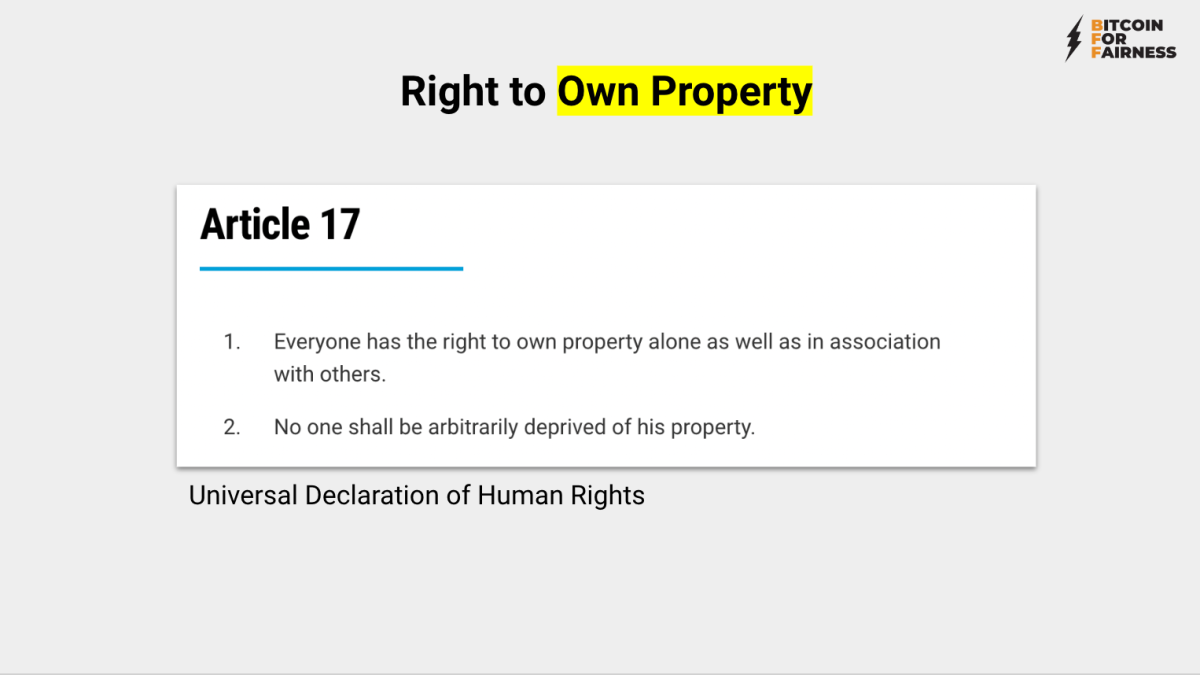
Seventy-five economies globally still limit women’s rights to manage assets. There are countries in which women are not allowed to own property or inherit it — they never will be owners of land that could be used as a security to apply for a loan or support their informal businesses. This is occurring mostly in countries in the Middle East, North Africa, South Asia, Sub-Saharan Africa, East Asia and the Pacific.
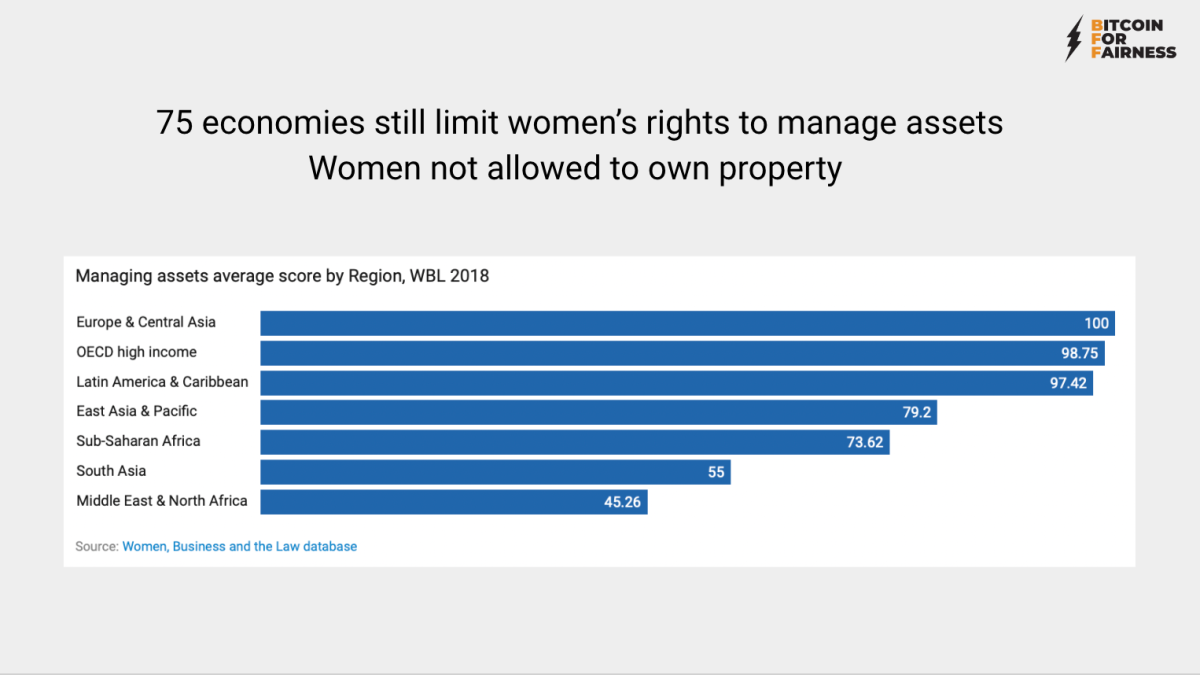
“Data shows that giving women greater access to assets through inheritance can change outcomes for children, particularly girls. In 1994, two states in India reformed the Hindu Succession Act to allow women and men the same ability to inherit joint family property. This altered control over assets within families and increased parental investments in daughters. Mothers who benefited from the reform spent twice as much on their daughters’ education, and women were more likely to have bank accounts and sanitary latrines where the reform occurred.”
Women are the majority of Kenya’s population; they perform 70% of the agricultural labor, but they own less than 2% of the land and control very little of the income produced by their labor. According to a Savings Learning Lab report, after being provided with savings accounts, market vendors in Kenya, primarily women, saved at a higher rate and invested 60% more in their businesses. Women-headed households in Nepal spent 15% more on nutritious foods (meat and fish) and 20% more on education after receiving free savings accounts. Moreover, farmers in Malawi who had their earnings deposited into savings accounts spent 13% more on farming equipment and increased their crop values by 15%.
Bitcoin empowers women and vulnerable groups, because one can own it secretly. No one needs to know. This lowers the danger of money being taken away by partners and family members.
In the near future, people will be able to use bitcoin as a collateral for micro loans. One can save as little as one cent or $1 in bitcoin a day on the Lightning Network. After saving a certain value, like $50, they can receive a micro loan. After paying back, they’ll get back the collateral.
How Bitcoin Fixes the Right to Property
Bitcoin is not only digital money, it’s digital property. Therefore, self custodying your bitcoin makes you an owner of property. Since Bitcoin is permissionless, the right to own property is granted to anyone.
Bitcoin Is a Silent Revolution
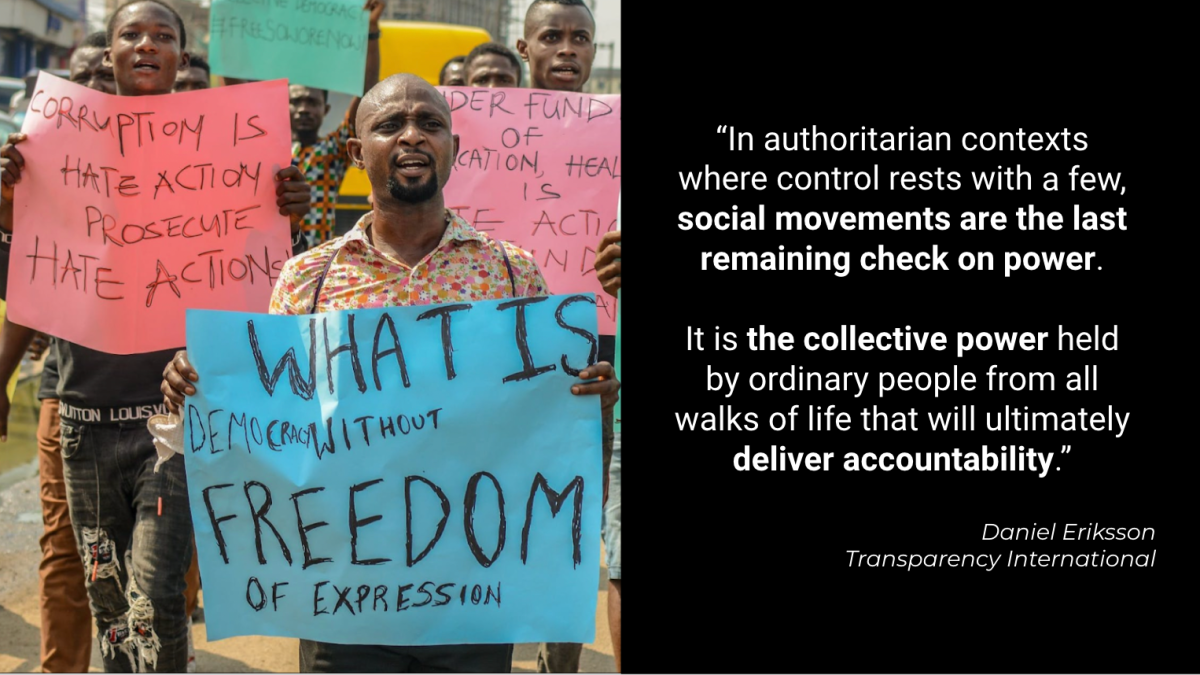
Source: Lagos, Nigeria — Activists protest against the controversial anti-social media bill introduced in the parliament, November 2019. Photo: Oluwafemi Dawodu/Shutterstock
Bitcoin is carried by a social movement. It’s a silent revolution. By being in charge of our private keys, each one of us is part of a collective with the power to force governments to be held accountable. With the help of Bitcoin, dictators can be toppled. Self custody your bitcoin, incapacitate them from the power to create and seize money and their funds will dry out. Hold them accountable by pressuring them to audit public funds.
It may sound illogical, but by using Bitcoin, you’re supporting freedom fighters globally and helping make the world more inclusive. This is why my non-profit initiative is called “Bitcoin For Fairness.” Ultimately Bitcoin doesn’t fix everything. There will always be rich and poor people. But Bitcoin definitely fixes one huge thing: It enables fair access to a borderless, neutral money that can’t be altered to the advantage of any single entity.
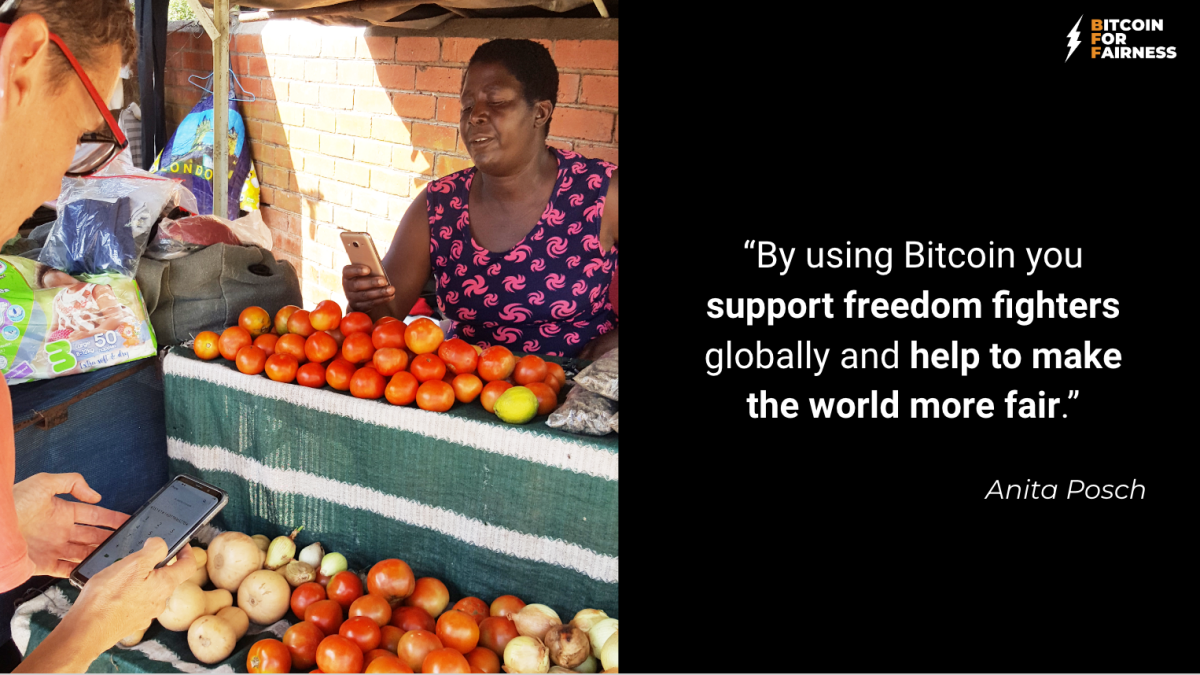
Bitcoin delivers the opportunity for historical reparation from the effects of colonialism. It can make the gap between rich and poor smaller. That’s why I put so much effort into sharing Bitcoin self-custody knowledge in African countries and the Global South. The peer-to-peer, non-KYC revolution will take place here, where people are used not to using banks. My motto is: “Keep the unbanked unbanked” and support them in their fight for financial freedom. I’m just an ally visiting and sharing knowledge. The local people are key. The opportunity is there, I trust they’ll take it and run.
Bitcoin isn’t useless, it’s priceless. Anyone who is lobbying for a Bitcoin ban or attempts to control it is an enemy of freedom and of humankind. It’s a voluntary network, if you don’t like it, don’t use it.
This is a guest post by Anita Posch. Opinions expressed are entirely their own and do not necessarily reflect those of BTC Inc or Bitcoin Magazine.


